Langum Foundation News
This page is for current and upcoming news of the Trust and its work. Check back here periodically for links to news stories, upcoming deadlines, and late-breaking information.
- The Langum Foundation Is Pleased to Announce the Winner of the 2023 David J. Langum, Sr. Prize in American Legal History
- The Langum Foundation Is Pleased to Announce the Winner of the 2023 David J. Langum, Sr. Prize in American Historical Fiction
- David J. Langum, Sr. Reinstated as Executive Director of The Langum Foundation
- The David J. Langum, Sr. Prize in American Historical Fiction Has Been Suspended
- Congratulations to Katherine Vaz for Her 2023 Publication of Above the Salt
- The Langum Foundation Is Pleased to Announce the Winner of the 2022 David J. Langum, Sr. Prize in American Historical Fiction
- The Langum Foundation Is Pleased to Announce the Winner of the 2022 David J. Langum, Sr. Prize in American Legal History
- The Langum Foundation Is Pleased to Announce the Winner of the 2021-2022 Malott Prize for Recording Community Activism
- The Langum Foundation Is Pleased to Announce the Winner of the 2021 David J. Langum, Sr. Prize in American Legal History
- The Langum Foundation Is Pleased to Announce the Winner of the 2021 David J. Langum, Sr. Prize in American Historical Fiction
- David J. Langum, Sr. Announces Intentions to Resign as Director of The Langum Foundation
- The Langum Foundation Is Pleased to Announce the Winner of the 2020 David J. Langum, Sr. Prize in American Legal History
- The Langum Foundation Is Pleased to Announce the Winner of the 2019-2020 Malott Prize for Recording Community Activism
- The Langum Foundation Is Pleased to Announce the Winner of the 2020 David J. Langum, Sr. Prize in American Historical Fiction
- The Langum Foundation Is Pleased to Announce the Winner of the 2019 David J. Langum, Sr. Prize in American Legal History
- The Langum Foundation Is Pleased to Announce the Winner of the 2019 David J. Langum, Sr. Prize in American Historical Fiction
- The Langum Foundation Is Pleased to Announce the Winner of the 2018 David J. Langum, Sr. Prize in American Legal History
- The Langum Foundation Is Pleased to Announce the Winner of the 2018 David J. Langum, Sr. Prize in American Historical Fiction
- The Langum Foundation Is Pleased to Announce the Winner of the 2017-2018 Malott Prize for Recording Community Activism
- The Langum Charitable Trust Changes Its Name
- The Langum Foundation Is Pleased to Announce the Winner of the 2017 David J. Langum Sr. Prize in American Legal History
- The Langum Foundation Is Pleased to Announce the Winner of the 2017 David J. Langum, Sr. Prize in American Historical Fiction
- The Langum Foundation Is Pleased to Present the 2017 Short List for Its 2017 David J. Langum, Sr. Prize in American Historical Fiction
- The Langum Foundation Is Pleased to Announce the Winner of the 2016 David J. Langum, Sr. Prize in Legal History/Biography
- The Langum Foundation Is Pleased to Announce Its Shortlist for the 2016 Langum Prize in American Legal History/Biography
- The Langum Foundation Is Pleased to Announce the Winner of the 2016 David J. Langum, Sr. Prize in American Historical Fiction
- The Langum Foundation Is Pleased to Announce the Winner of the 2015-2016 Malott Prize
- The Langum Foundation Is Pleased to Announce the Winners of the 2015 David J. Langum, Sr. Prize in American Legal History/Biography
- The Langum Foundation Is Pleased to Announce the Honorees of the 2015 David J. Langum, Sr. Prize in American Historical Fiction
- The Langum Foundation Is Pleased to Announce the Winners of the Malott Prize for Recording Community Activism for 2013-2014
- The Langum Foundation Is Pleased to Announce the Winners of the 2014 David J. Langum, Sr. Prize in American Legal History/Biography
- The Langum Foundation Is Pleased to Announce the Honorees of the 2014 David J. Langum, Sr. Prize in American Historical Fiction
- The Langum Foundation Announces Winners of the 2013 David J. Langum, Sr. Prize in American Legal History/Biography
- The Langum Foundation Releases Readers Guidelines for the David J. Langum, Sr. Prize in American Historical Fiction
- The Langum Foundation Is Pleased to Announce the Winners of the 2013 David J. Langum, Sr. Prize in American Historical Fiction
- The Langum Foundation Is Pleased to Announce the Shortlist of the First Half of 2013 for the David J. Langum, Sr. Prize in American Historical Fiction
- Once Again Random House Censors Books
- The Langum Foundation Is Pleased to Announce the Winners of the Malott Prize for Recording Community Activism for 2011-2012
- The Langum Foundation Announces Winners of the 2012 David J. Langum, Sr. Prize in American Legal History/Biography
- The Langum Foundation Announces Winner of the David J. Langum, Sr. Prize for American Historical Fiction for 2012
- The Langum Foundation Announces First Half of 2012’s Shortlist for the David J. Langum, Sr. Prize in American Historical Fiction
- The Langum Foundation Announces Winners of the 2011 David J. Langum, Sr. Prize in American Legal History
- The Langum Foundation Announces Winner of the 2011 David J. Langum, Sr. Prize in American Historical Fiction
- The Langum Foundation Begins Shortlist Program
- The Langum Foundation Announces Winner of the Gene E. and Adele R. Malott Prize for Recording Community Activism for 2009-2010
- The Langum Foundation Announces Winner of the 2010 David J. Langum, Sr. Prize in American Legal History
- The Langum Foundation Announces Winner of the 2010 David J. Langum, Sr. Prize in American Historical Fiction
- The Langum Foundation Announces Winner of the 2009 David J. Langum, Sr. Prize in American Historical Fiction
- The Langum Foundation announces the first winner of the newly created and unique Malott Prize for Recording Community Activism
- The Langum Foundation suspends prize presentations at Birmingham, Alabama and Port Townsend, Washington
- The Langum Foundation Announces Winner of the 2008 David J. Langum, Sr. Prize in American Historical Fiction
- The Langum FoundationFoundation Announces Winner of the 2008 David J. Langum, Sr. Prize in American Legal History
- Random House and Cowardly Self-Censorship
- San Jose State University Library’s Special Collection Department Accessions a Portion of David J. Langum, Sr.’s Legal Files
- Kurt Andersen Wins 2007 Langum Prize in Historical Fiction
- The Langum Foundation Announces Winner of the 2007 David J. Langum, Sr. Prize in American Legal History
- The Langum Foundation Sponsoring the Gene E. and Adele R. Malott Prize for Recording Community Activism
- The Langum Foundation Deeply Laments the Suspension of Publication of American Heritage
- The Langum Foundation Announces Changes In Its David J. Langum, Sr. Prize In American Historical Fiction
- Books from Small Presses Now Eligible for Historical Fiction Prize
- Travel to Collections Grants Now Available
MAY 2, 2024
The Winner of the 2023 David J. Langum, Sr. Prize in American Legal History is Before the Movement: The Hidden History of Black Civil Rights, by Dylan C. Penningroth


In this capaciously conceived study, Dylan Penningroth looks beyond the familiar narrative of the post-Civil Rights Movement to explain how Blacks used the law in their daily lives to promote their rights, going back as far as the era of slavery. His meticulous research, which draws upon the archives of his own family, demonstrates how Blacks effectively made use of the the law of contracts, property, tort, domestic relations, and inheritance. By providing a more expansive and nuanced understanding of Black freedom, Before the Movement is a transformative achievement. – D.S.
FEBRUARY 15, 2024
The winner of the 2023 David J. Langum, Sr. Prize in American Historical Fiction is Susanna Moore, The Lost Wife
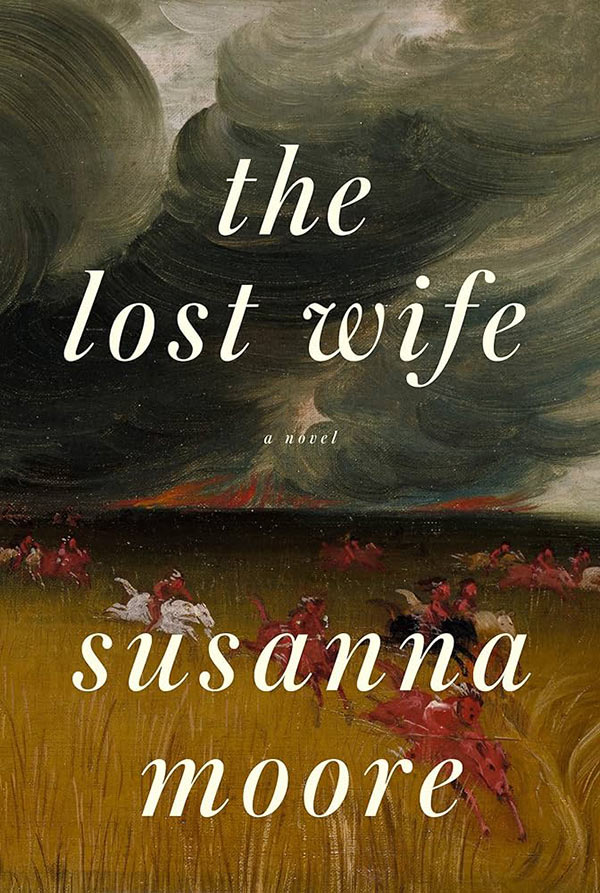

Susanna Moore’s new novel explores a lesser known incident of American history. Forced to the breaking point by undelivered rations and shrinking territory, starving Dakotas waged war against white settlers in Minnesota in 1862. The Dakota War lasted six weeks. During that time, the Dakotas attacked settlers and took over 100 women and children captive.
The Lost Wife documents the story of one such captive: Sarah Brinton. However, Brinton’s story of a woman’s precarious survival in nineteenth-century America begins much earlier. First she escapes from an abusive husband in Rhode Island. She travels west to join a friend only to discover that her friend recently perished from cholera. Sarah then marries a widowed doctor John Brinton. She is aware of her lack of past and what power that might have over her. While living on the frontier, Sarah learns the Dakota language and culture, knowledge which serves her later in captivity.
When she is taken, she is protected by a Dakota man called Chaska who claims her as his wife. When the uprising was quelled by the U. S. Army, the captives were returned to their original families. Sarah returns and begs to deaf ears for clemency for the Dakotas who protected her and her two small children.
Throughout the novel, Sarah sits uncomfortably in “two worlds”, not accepted by either. However, this is intensified after captivity and return.
Sarah’s story is loosely based on Sarah F. Wakefield’s Six Weeks in the Sioux Tepees: A Narrative of Indian Captivity (1864). Facing “false and slanderous stories,” Wakefield was careful to portray her Chaska as fatherly and protective. Sarah Brinton also faces shame and gossip upon reintegration. Paraphrasing her husband, Sarah relates: “other white women were not as obliging. They refused to dress in buckskin and moccasins and braid their hair, and did not converse happily with their captors in Dakota, yet they are now at home with their loving families, untainted by shame and dishonour. ‘But perhaps you liked it,’ he said.”
Despite the anguish and atrocities on both sides, Sarah’s first person narration is economical and unflinching. This compact and compelling novel illuminates a forgotten episode of American history. – V.L.
– – – – –
The finalist of the 2023 David J. Langum, Sr. Prize in American Historical Fiction is American Ending, by Mary Kay Zuravleff
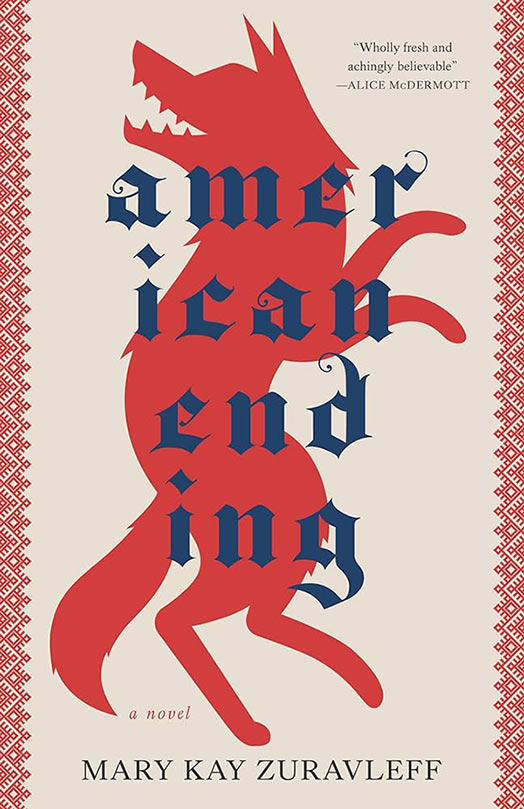

American Ending is an immigrant novel concerned with a community of Old Believers Russian Orthodox settled in the coal-mining districts of early 20th century Pennsylvania. It is filled with details of the time, place, and culture of the people depicted. Almost of necessity the book has an engaging young female protagonist with a primary focus on her and her extended family. However, the author takes care to include the Old Believer community in general, greatly increasing the historical verisimilitude of the work. It is a lively and well-written story. – D.J.L, Sr.
FEBRUARY 13, 2024
David J. Langum, Sr. Reinstated as Executive Director of The Langum Foundation
At the February 12, 20234 meeting, the Board of Directors resolved to reinstate David J. Langum, Sr. as Executive Director of The Langum Foundation, effective immediately. This was done with the approval and support of David J. Langum, Jr., the erstwhile Executive Director.
FEBRUARY 13, 2024
The David J. Langum, Sr. Prize in American Historical Fiction Has Been Suspended
At the February 12, 2024 meeting, the Board of Directors resolved to suspend the operations of the David J. Langum, Sr. Prize in American Historical Fiction. This action was taken at the recommendation of the Selection Committee. The problem is that we have had a recurrent and serious difficulty in acquiring and retaining initial readers. This year we had approximately 45 submissions, and this was somewhat lower than previously. However, we had readers for only the first few months of 2023, and there is no reason to believe this difficulty will be resolved, at least in the immediate future. This volume of books creates an extreme and unsustainable burden for our two-person Selection Committee to handle themselves. The Foundation will continue to award the Langum Prize in American Legal History and Biography and the Malott prize for Recording Community Activism.
JANUARY 8, 2024
Congratulations to Katherine Vaz for Her 2023 Publication of Above the Salt
The Foundation wishes to congratulate Katherine Vaz for her 2023 publication of Above the Salt, a novel about the immigration of protestant Portuguese into antebellum Illinois. Ms. Vaz received a travel grant from The Langum Foundation that enabled her to utilize the Langum Family Papers and the de Mattos Family Papers, both held by the Abraham Lincoln Presidential Library in Springfield, Illinois in the preparation of this book.
APRIL 26, 2023
The winner of the 2022 David J. Langum, Sr. Prize in American Historical Fiction is Mercury Pictures Presents, by Anthony Marra
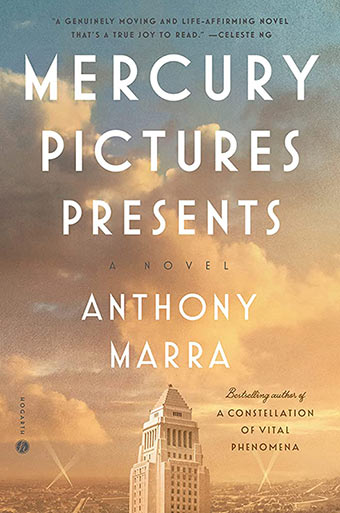

Anthony Marra’s gripping Mercury Pictures Presents explores an unusual and carefully researched perspective into World War 2. Split between Hollywood and an Italian prison camp, the novel follows several interconnected lives at the point when America is just about to enter the war and shortly after. At the centre is Maria Lagana, an Italian political prisoner’s daughter and ambitious associate producer for a B-movie studio, “a job that demanded the talents of a general, diplomat, hostage negotiator, and hair-dresser”. The novel plays with viewpoint, surveillance and artifice. In a sudden reversal, Mercury Pictures shifts from defending itself in Congressional hearings about promoting pro-war messages to producing propaganda films for the War Department. Ultimately, they combine enemy propaganda and scenes produced in the studio rather than actual footage as “soundstage skirmishes look more realistic than the real ones”. While covering a full cast and wide geographic scope, Marra creates richly realized characters in vivid prose. Throughout, the story is comic, absurd and touching. – V.L.
– – – – –
The finalist of the 2022 David J. Langum, Sr. Prize in American Historical Fiction is The Magic Kingdom, by Russell Banks
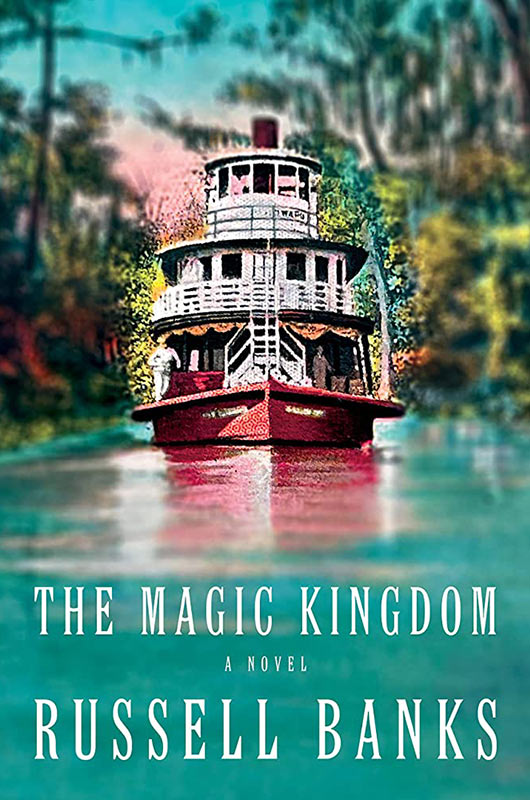
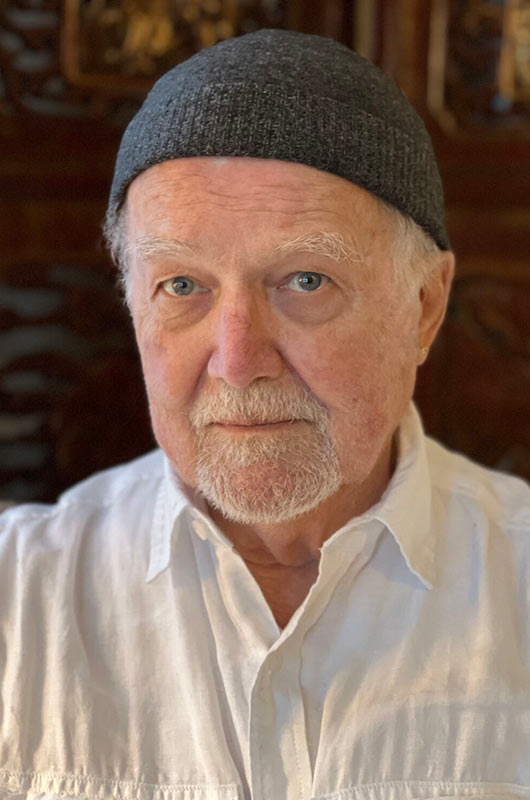
The protagonist, Harley Mann, then an eccentric and somewhat crotchety old man, dictated these fictional memoirs into a tape recorder on the porch of his modest home in St. Cloud, Florida. Mann’s early years were spent with his family in an Indiana Ruskinite commune. The father’s ideological differences caused the family to move. This rigid adherence to principle ultimately hurt his son, Harley, as well. They settled in Florida in miserable conditions. The father then died, and Mann’s mother made a connection with a Shaker colony, New Bethany, located in the general vicinity of the present-day Disney World.
They arrived in New Bethany in 1902, and Mann grew into early adulthood there as a trusted young man who could not formally become a Shaker until he was 21. At age 12 he met Sadie Pratt, a sufferer from consumption and who lived at a hospital colony near New Bethany. When the hospital collapsed financially, she moved to New Bethany. Mann gradually fell into an obsessive love for Sadie, and after she moved to New Bethany they became lovers. We know that Pratt was attractive and about six years older than Mann, but not much else. Although one might ordinarily think of her as an undeveloped character, we must bear in mind that the entire affair is told, long after the fact, by an old man recalling an obsessive love. Pratt’s condition turns to the worse, and she dies, in a tangle of circumstances that result in Pratt’s accusation to the authorities that the leading elders over-administered her morphine. In turn, this leads the Shaker community to shun their accuser.
It is unusual that an historical novel dwells on the Shakers, but here they are given full attention, showing their beliefs, rituals, and practices. Another feature of the book, also fresh, is its consideration of riverboats as the usual method of transportation in middle Florida in the early 20th century. The book is engaging, and the narrative voice holds the reader well. – D.J.L. Sr.
APRIL 13, 2023
The Winner of the 2022 David J. Langum, Sr. Prize in American Legal History is The Sewing Girl’s Tale: A Story of Crime and Consequences in Revolutionary America by John Wood Sweet
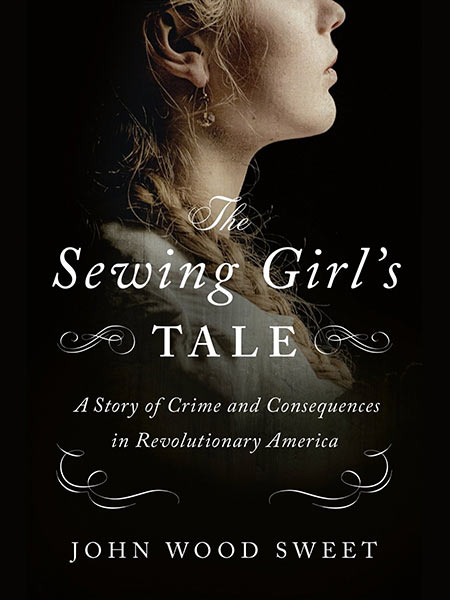

In this riveting and exhaustively researched account of one of the first rape trials, The Sewing Girl’s Tale brilliantly surveys the intersection of gender and class biases in its vivid portrayal of the social, cultural, and economic life of 1790s Manhattan and exposes the tensions between the democratic ideals of the new republic and the persistence of oppression of women and the working classes. In recreating the long-ago world of Lanah Sawyer, the aggrieved seamstress, John Wood Sweet provides an inspiring example of how disadvantaged persons can challenge injustices and shape their destinies in the face of great obstacles. – W.G.R.
– – – – –
The Finalist of the 2022 David J. Langum, Sr. Prize in American Legal History is Democratic Justice: Felix Frankfurter, the Supreme Court, and the Making of the Liberal Establishment by Brad Snyder
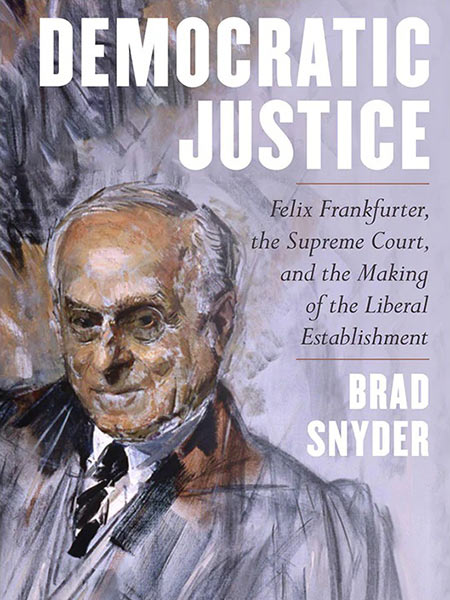

In his exhaustively researched, deftly written, and timely biography of Felix Frankfurter, Brad Snyder helps us make sense of an often misunderstood and mischaracterized member of the modern Supreme Court. At a moment when the Court holds far less promise as an engine of social reform, Democratic Justice: Felix Frankfurter, the Supreme Court, and the Making of the Liberal Establishment paints a picture of a jurist whose ideology we are only now more fully equipped to appreciate. – D.S.
FEBRUARY 5, 2023
The winner of the 2021-2022 Malott Prize for Recording Community Activism is The Water Defenders: How Ordinary People Saved a Country from Corporate Greed, by Robin Broad and John Cavanagh, Beacon Press (Boston), 2021.
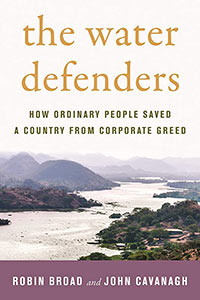

Robin Broad and John Cavanagh describe the courageous work of activists protecting their communities in northern El Salvador. Their activism transcended the boundaries of their small, densely populated nation, bringing in groups from around the world, but they remained devoted, above all else, to preserving their community in the face of exploitation by vast corporate and banking interests. The Water Defenders is a tale of community organizing in the globalized Twenty-First Century. It is told with passion and sophistication by its authors, and stands as a tribute to the bravery of local and global activists who worked to preserve the resources—both natural and human—of communities in El Salvador. In doing so, the authors prove to be richly deserving of the Malott Prize for Recording Community Activism. – F.S.
– – – – –
The finalist of the 2021-2022 Malott Prize for Recording Community Activism is Paradise Falls: The True Story of an Environmental Catastrophe, by Keith O’Brien, Pantheon Books (New York), 2022.
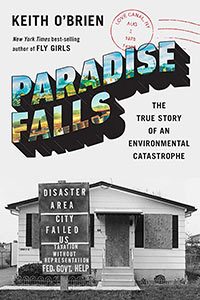

Keith O’Brien provides a vivid account of community activism in the infamous case that has come to be known as “Love Canal.” In Paradise Falls, he combines a novelistic narrative with a reporter’s eye to detail, to bring out the drama of a community besieged by environmental catastrophe, and their desperate, and ultimately heroic, efforts to hold corporations and governments accountable. His account seamlessly links their fight to larger political developments, but it never loses sight of the aspirations of people living in the community of Niagara Falls, NY, and their fight for justice. – F.S.
APRIL 8, 2022
The Winner of the 2021 David J. Langum, Sr. Prize in American Legal History is Traveling Black: A Story of Race and Resistance by Mia Bay
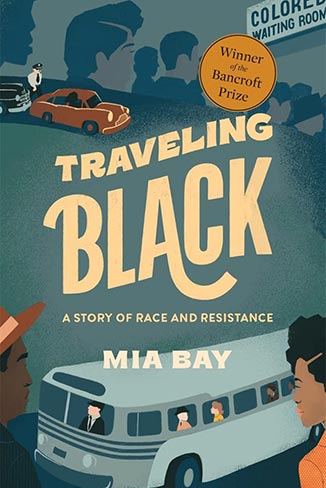

“American identity has long been defined by mobility and the freedom of the open road, but African Americans have never fully shared in that freedom,” Mia Bay writes in her extraordinary, elegant, and moving new book. From stagecoaches and steamships to trains, planes, and automobiles, travel throughout the nation has been the site of racial discrimination and African American resistance. Bay brilliantly demonstrates how travel became the flash point for racial conflict and reminds us how many Rosa Parks preceded Rosa Parks. This superbly researched story takes us beyond the courtroom to the actors who agitated to end segregation in transportation and demonstrates the changing–and continuing–ways they navigated race and shared space. Brava! – L.K.
– – – – –
The Finalist of the 2021 David J. Langum, Sr. Prize in American Legal History is Vice Patrol: Cops, Courts, and the Struggle over Urban Gay Life before Stonewall by Anna Lvovsky
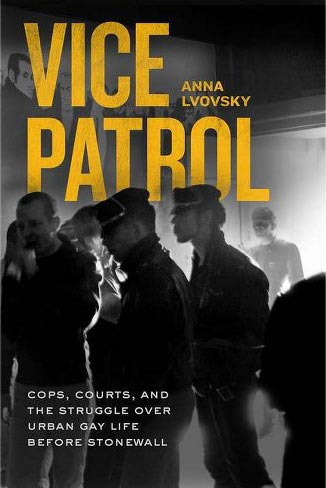

In this wide-ranging and imaginative study, Anna Lvovsky centers the law’s confrontation with gay life in the United States in the mid-20th century, training her eye on criminal justice at the local level. Lvovksy illuminates the tensions between, on the one hand, state liquor agencies established post-Prohibition and the newly-formed vice patrols of local police forces, and, on the other hand, state trial courts, where judges exercised discretion to temper what they viewed as bureaucratic and law enforcement excesses. While this story alone would render Vice Patrol an important addition to our burgeoning history of the American criminal justice system, the study is all the more important for a larger dynamic Lvovsky’s study reveals: that the project of policing gay life prior to Stonewall was not simply a contest over sexual practices or public conduct, but also was the site of an institutional struggle over the boundaries of the criminal justice system itself. – D.S.
JANUARY 24, 2022
The winner of the 2021 David J. Langum, Sr. Prize in American Historical Fiction is Ridgeline, by Michael Punke
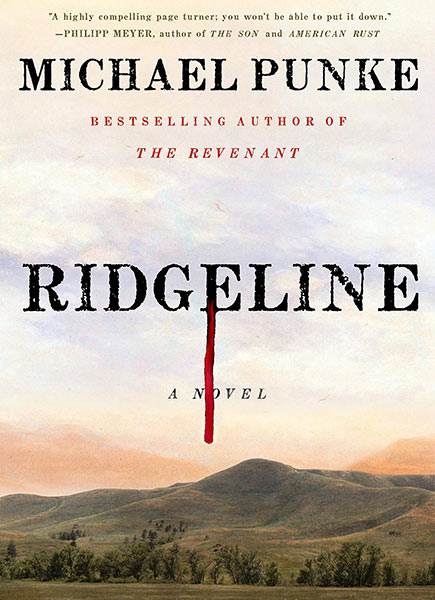

This is the story of a battle that delivered the U.S. Army its second largest loss of the Indians Wars, exceeded only by Custer’s debacle at the Little Big Horn. American accounts commonly refer to this as the Fetterman Fight or Fetterman massacre, occurring near Fort Phil Kearny in Wyoming. The local Indian tribes in a rare example of co-operation assembled over 1,000 warriors, and then used a strategy of decoy to lure about 80-100 American soldiers into a tight canyon around which the Indian warriors were hidden. Using a clever system of signals, the Indians were able to charge the Americans at a single instant and annihilate them.
It is more than just a war story in that the author carefully covers the Indian motivations. Well-told through fiction, entire chapters cover their historical grievances that led to this particular encounter and their careful planning. It is well-written and loaded with history, from both the American and the Indian perspectives. The book is an even-handed work of excellent fiction, loaded with history brought out in the narrative without being in the least bit pedantic or tendentious. A skillful job. – D.J.L., Sr.
– – – – –
The finalist of the 2021 David J. Langum, Sr. Prize in American Historical Fiction is When the Stars Rain Down, by Angela Jackson-Brown
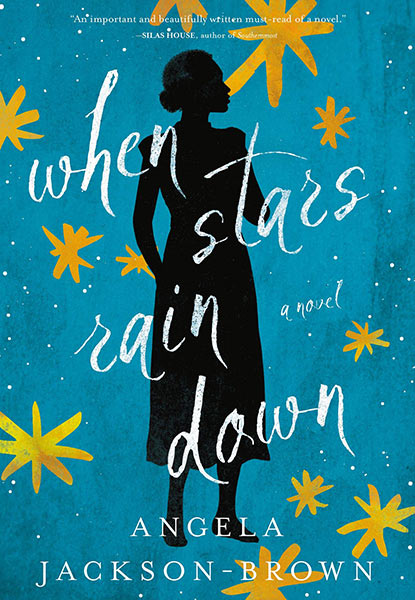

When the Stars Rain Down is a coming-of age story set in small-town Georgia in the 1930s. The summer heat is oppressive, as is the sense of foreboding for teenager Opal. Opal lives in “Colored Town,” an enclave of African-American residents of the fictional town Parsons. With her grandmother, Opal works as a housekeeper for a family she has known for her entire life and considers family. However, the strength of this bond is tested during several horrific incidents of racial violence in the town. These events force Opal to examine her relationship with her employers and community. In a simple and absorbing style, the novel draws the reader into Opal’s rich and complex inner life as she negotiates romance, religion and emotional labor and pain. With its tightly drawn historical context and characters, When the Stars Rain Down is a timely book. – V.L.
SEPTEMBER 1, 2021
David J. Langum, Sr. Announces Intentions to Resign as Director of The Langum Foundation
The Director of The Langum Foundation, David J. Langum, Sr., has announced his intention to resign his directorship effective October 1, 2021. He will become the Chairman of the Board and his son, David J. Langum, Jr., will assume the directorship as the Executive Director.
Langum stated “I began this foundation more than 20 years ago, and it has grown into a healthy and self-sustaining organization with three literary prizes, the strong possibility of a fourth to be added, and a travel to collections program. I am personally pleased and gratified by the development of The Langum Foundation, but since I am now 81 years old I also believe that the work should be passed on to younger hands and eyes.”
“As the Chairman of the Board I will still have some over-arching authority, while passing on operational details to a younger generation. Specifically, I intend to work on the over-all development of the Foundation, including a fourth prize. I also will remain a member of the selection committee for the historical fiction prize.”
Also effective November 1, 2021 two new trustees are added to the Board of Trustees: Audrey Langum and Frederick M. Shepherd. The Board now consists of David J. Langum, Sr., Chairman; Audrey Langum; David J. Langum, Jr.; Virginia Langum; William G. Ross; and Frederick M. Shepherd.
The chairs of the selection committees now consist of Bethany Latham, Chairwoman, The David J. Langum, Sr. Prize in American Historical Fiction; William G. Ross, Chairman, The David J. Langum, Sr. Prize in American Legal History; and Frederick M. Shepherd, Chairman, The Gene E. and Adele R. Malott Prize for Recording Community Activism.
JUNE 4, 2021
The Winner of the 2020 David J. Langum, Sr. Prize in American Legal History is Sara Mayeux’s Free Justice: A History of the Public Defender in Twentieth-Century America (University of North Carolina Press, 2020). Mayeux is associate professor of law and associate professor of history at Vanderbilt.
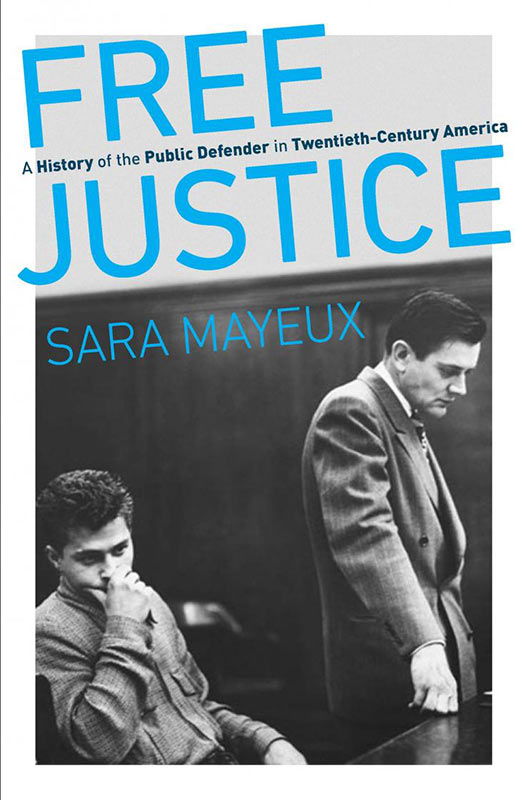

This important, beautifully written book explores the emergence of the public defender during long Progressive era, a time when the United States faced the same paradox of poverty amid progress and wealth against commonwealth that it confronts today. The idea took wings even though white-shoe lawyers considered indigent criminal defense a job for private charity and equated public defense with socialism and totalitarianism. As was so often the case, the Cold War turned everything upside down. By the mid-twentieth century, elites had repurposed the public defender as a weapon of anticommunism, a way of showing American law’s special respect for individual rights—a way of vindicating the constitutional rights of defendants, especially the right to counsel that the Warren Court supposedly guaranteed in Gideon v. Wainwright. Mayeux powerfully challenges the standard interpretation that states were moving towards establishing public defender offices in the North and West and that Gideon accelerated that movement only in the South, where white supremacy reigned. She shows us how Gideon transformed the provision of legal services to criminal indigents across the United States—not always for the better. A big book that shows the legal profession and public defenders shaping and being shaped by society, Free Justice is neither a feel-good story nor another “lost promise of Gideon and the Warren Court” account. Mayeux brilliantly shows us roads not taken, highlights contingency, and shows us how matters might have turned out differently. And in reminding us of that, she enables us to imagine a more hopeful future. – L.K.
– – – – –
The Finalist of the 2020 David J. Langum, Sr. Prize in American Legal History is Richard B. Bernstein’s The Education of John Adams (Oxford University Press, 2020). Bernstein is an adjunct professor at New York Law School.
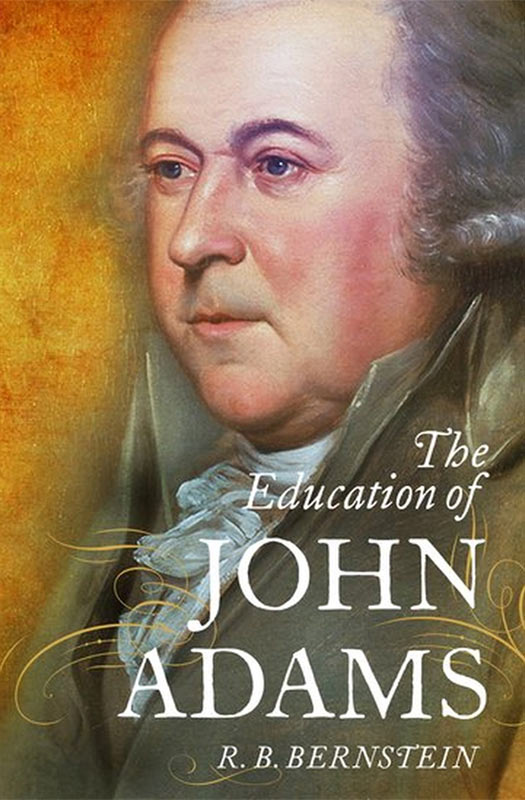
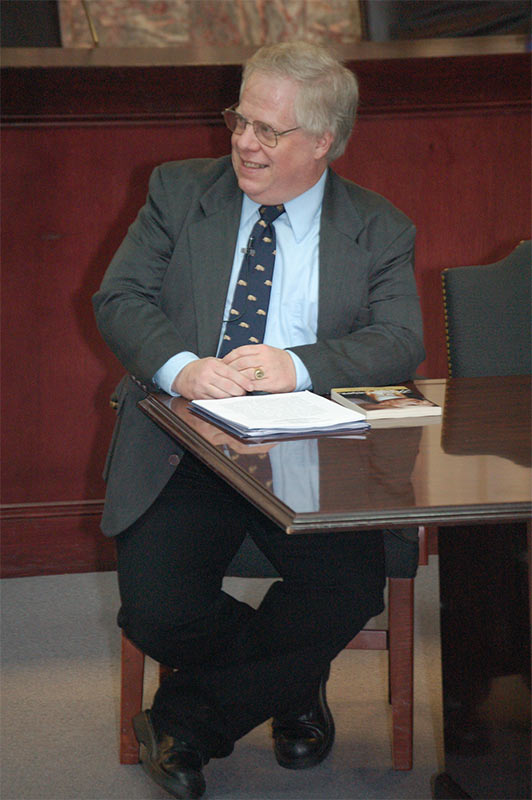
APRIL 7, 2021
The winner of the 2019-2020 Malott Price for Recording Community Activism is This is Ohio: The Overdose Crisis and the Front Lines of a New America, by Jack Shuler (Counterpoint, 2020)
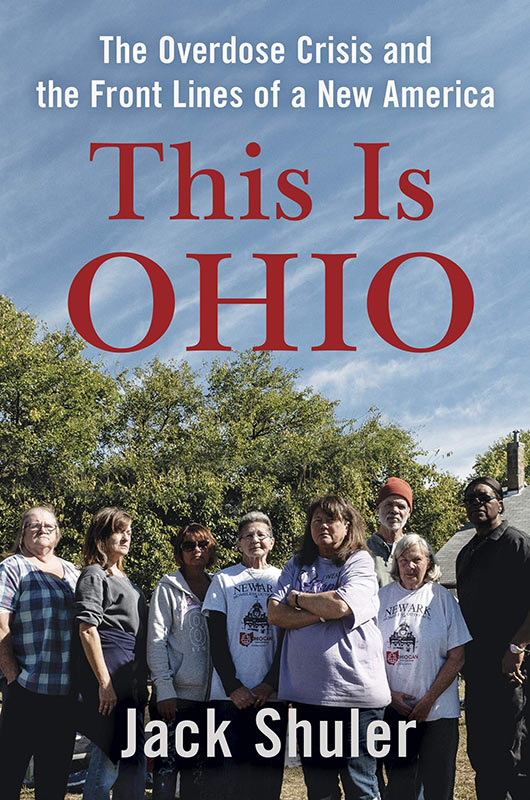
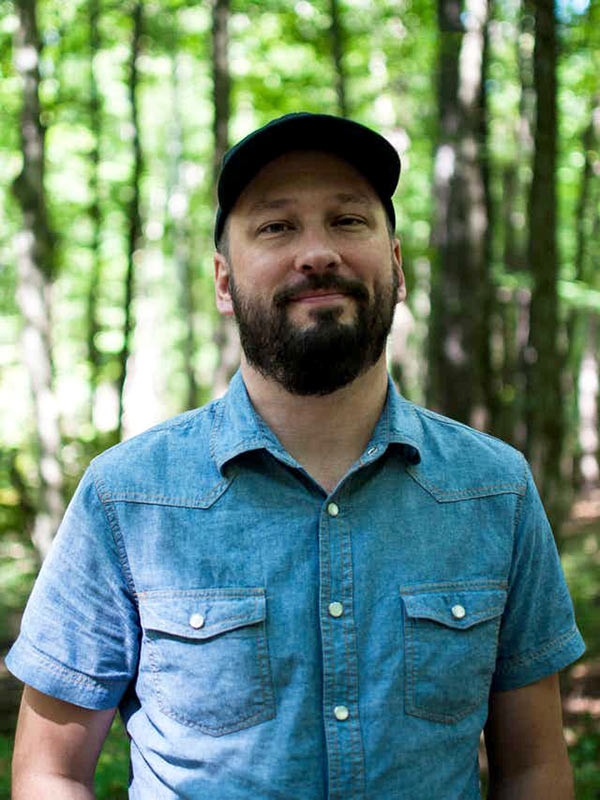
Jack Shuler demonstrates with compelling clarity that, when the drug-addicted and downtrodden join together to fight for themselves, they can overcome societal scorn, win some battles and gain dignity and humanity in the face of hostile courts and an economy that offers few viable options. Through the story of resistance and struggle in the small Ohio town of Newark, typical of many places in the US today, Shuler shows how shut-down factories, crumbling infrastructure, job loss and unresponsive government – not moral failure – lead to hopelessness and addiction. More importantly, he demonstrates that the solution lies with the organization and drive of those most affected. Not every battle is won and not every addict is saved. It is a steep climb back from impoverishment and drug dependence but only a fight led by those who are there and have been there offers real hope because only they can persuade other victims that they were not bound to lose and that they could be good to others and good for something. – D.G.
– – – – –
The finalist status for the 2019-2020 Malott Prize in Recording Community Activism is Beyond the Usual Beating: The Jon Burge Police Torture Scandal and Social Movements for Police Accountability in Chicago, by Andrew S. Baer (University of Chicago Press, 2020)
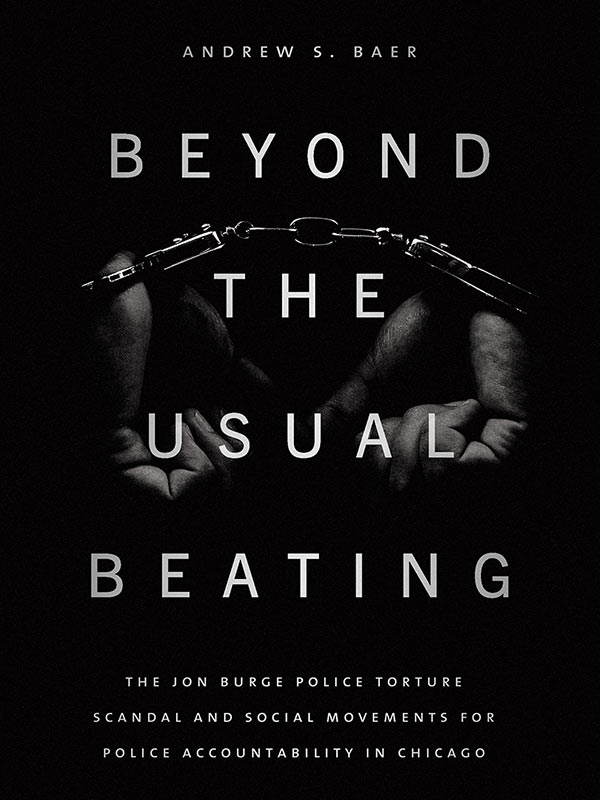

Andrew Baer’s book could not be more timely in bringing to light the recent history of police brutality in a large midwestern city. The book focuses on what can only be called a systematic policy of torture under the leadership of police commander Jon Burge (with the explicit or implicit support of numerous Chicago mayors). It is also timely in describing the coordinated grass-roots efforts to address this injustice and push for systematic reform. Its focus on an era that followed the national civil rights movement, and on an especially vivid case of police misbehavior, makes the book an especially valuable contribution to our understanding of racial politics in the United States. What makes it even more significant is its careful analysis of a successful campaign, on the streets and in the halls of power, to eventually hold perpetrators accountable and change police behavior.
Baer brings a scholar’s approach to this dramatic and pressing topic. He places the ability of a police chief to operate with impunity in the larger historical and political context of the backlash against the assertion of African-American rights in the 1960s and 1970s. He correctly emphasizes the deindustrialization that gutted many of Chicago’s neighborhoods. Baer brings a similarly deep analysis to the activism that emerged in response to police torture and militarization, building on existing theories of social movements and political change. It is in this theoretical and political context that Baer is able to make the larger lessons of this dark chapter of Chicago history particularly persuasive. What the book may lack in narrative pace, it more than makes up for in a rich and deep analysis of an important topic. Those attempting to draw lessons and forge strategies for current anti-racist police reform movements would do well to immerse themselves in the details of this fine, comprehensive and moving account. – F.S.
MARCH 29, 2021
The Winner of the 2020 David J. Langum, Sr. Prize in American Historical Fiction Is The Cold Millions by Jess Walter
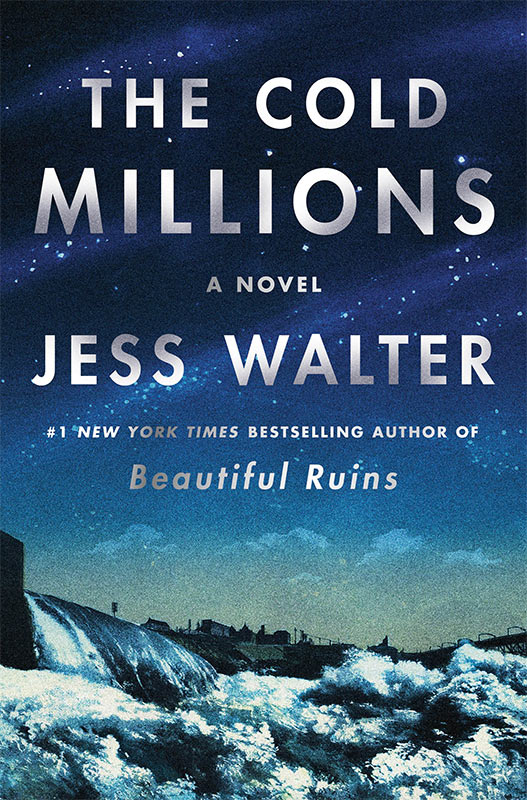

Jess Walter’s The Cold Millions is a novel of the burgeoning Pacific Northwest that presents history through an engaging storytelling voice brimming with both humor and pathos. In the early 20th Century, Ryan “Rye” Dolan, a 16-year-old orphan, sets off from Montana in search of his older brother, Gregory (Gig). Finally reuniting in Washington state, Rye and Gig ride the rails, attempting to make ends meet amidst obstacles that include ruthless employers, corrupt job agencies, and Gig’s less than responsible approach to life. This approach leads Gig to join a group of idealists and later the Industrial Workers of the World. Rye is less than taken with the unions, which he sees as a sure-fire ticket to jail and beatings from local law enforcement. Despite his misgivings, Rye is pulled into the middle of the workers’ rights struggle when a beautiful young activist (the historical Elizabeth Gurley Flynn), travels to Spokane to stir things up. In a desperate attempt to free Gig from imprisonment for his union activities, Rye is forced into a devil’s bargain with a dangerous mining magnate. The history of this period of labor unrest is woven seamlessly into the plotting, allowing The Cold Millions to illuminate an era that is often overlooked. Walter’s characterization and multiple narrative perspectives, from Pinkertons to burlesques, add even more color to an already vibrant portrayal of the tramp lifestyle amid the industrialization of the Pacific Northwest. The result is an entertaining and riveting read. – B.L.
– – – – –
Finalist for the 2020 David J. Langum, Sr. Prize in American Historical Fiction Is The Book of Lost Light by Ron Nyren (Black Lawrence Press, 2020)
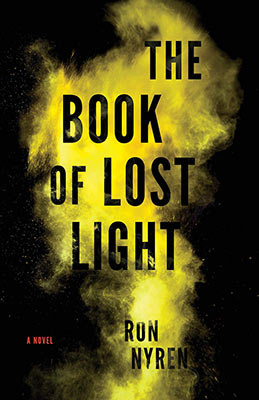

Set in San Francisco and surrounding areas at the turn of the 19th century, this novel portrays the activities of an eccentric tiny family. The father, Arthur, is a portrait photographer, mechanical genius, and a somewhat unstable man. His wife died in the childbirth of their son Joseph, and the family is saved by the arrival of Arthur’s orphaned niece. She herself is a bit eccentric, but stable enough to keep Arthur in reality and to serve as a surrogate mother to Joseph. Arthur has some peculiar theories about the nature of time, and how he might capture the essence of time by taking a photograph of his unclothed son, Joseph, in the same pose at the exact same time of each and every day. The dynamics between father and son form the heart of this novel, and the reader can anticipate the time when Joseph as an adolescent ultimately rebels.
The prose is engaging and the descriptive passages illuminative. We read a vivid description of the San Francisco earthquake and its effects on the everyday citizenry of San Francisco. There is much here on the history of photography. Before Joseph was born, Arthur worked for Eadweard Muybridge, an actual historical person, at his experiments with the photography of motion that he conducted at Leland Stanford’s farm. There is considerable discussion of Muybridge and his and other early photographers’ work, and this gives the reader a good sense of the period and a feel for technological innovation in photography during this period. The book feels fresh. – D.J.L., Sr.
JUNE 4, 2020
The Winner of the 2019 David J. Langum, Sr. Prize in American Legal History is Sarah A. Seo for her Policing the Open Road: How Cars Transformed American Freedom.
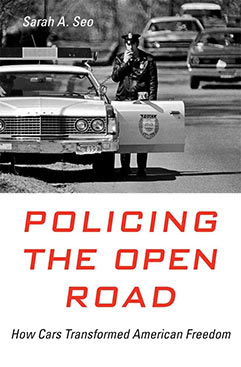

Sarah Seo’s Policing the Open Road: How Cars Transformed American Freedom is an inventive interweaving of technology, society, and criminal procedure that reveals a paradox formerly unacknowledged but so obvious once pointed out: at the same time that the mass-produced automobile brought unprecedented mobility to a wide swath of American society, it also subjected people to an unimaginable level of government authority, utterly reworking the meaning of freedom in the United States. Seo’s sweeping account takes us from the beginnings of traffic enforcement, as police departments were transformed from foot patrols to motor cops; through Prohibition, where the automobile played a vital role in the cat-and-mouse game of liquor control and the Fourth Amendment’s protection against unreasonable searches began to be riddled with exceptions; to the modern era, when the phrase “driving while black” emerged to expose a racialized policing of automotive conduct that in fact continued unabated from the Jim Crow Era to the 21st century. This is a book that scholars will admire for its creativity and careful research, while lay readers will never look at getting behind the wheel in the same way again. – D.S.
– – – – –
The Finalist of the 2019 David J. Langum, Sr. Prize in American Legal History is Jessica K. Lowe for her Murder in the Shenandoah: Making Law Sovereign in Revolutionary Virginia.
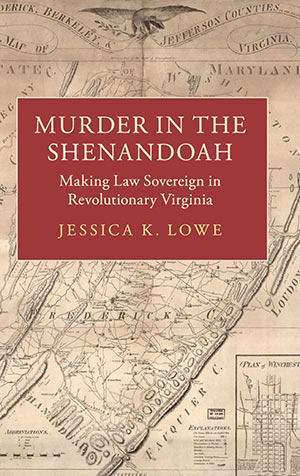

This beautifully written book is history in a grain of sand writ large. Jessica Lowe masterfully transforms a brawl and homicide into a prism on post-Revolutionary Virginia’s legal system already rife with “tense discussion about what it meant to make law ‘king.’” Murder in the Shenandoah is narrative history and legal history at its finest. Brava! – L.K.
MARCH 8, 2020
The Winner of the 2019 David J. Langum, Sr. Prize in American Historical Fiction Is Mark Barr for Watershed (Hub City Press)
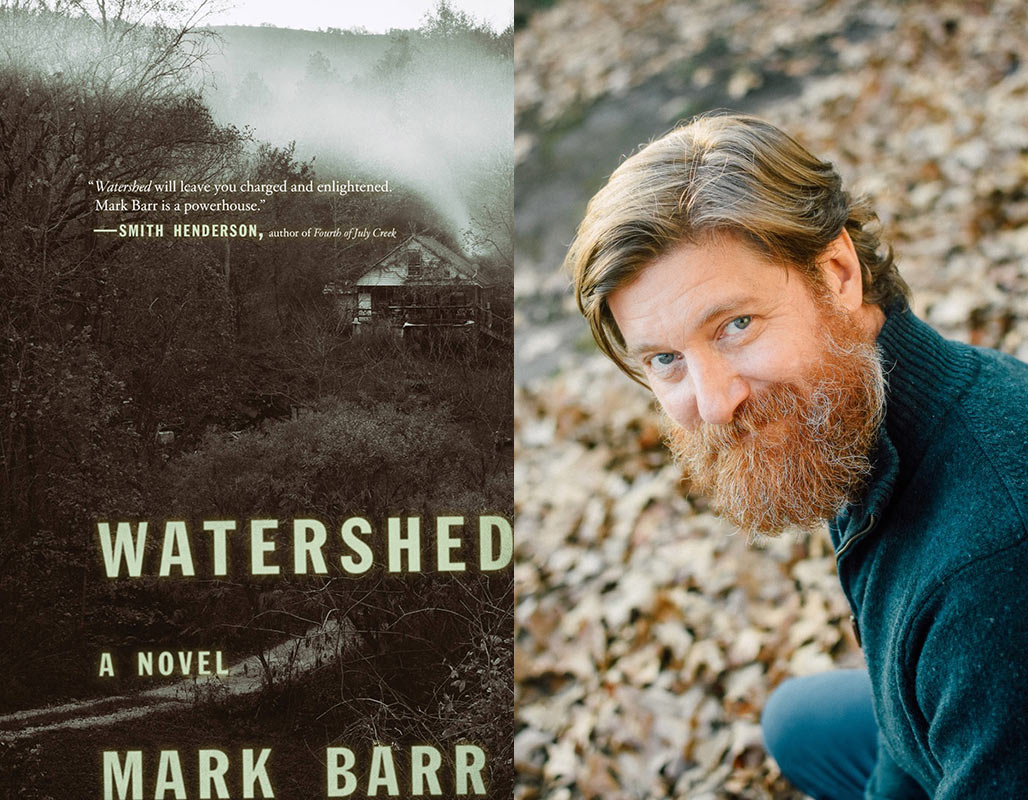 Reading Mark Barr’s Watershed is an immersive historical experience, a pitch-perfect evocation of a time, a place, and a culture. In the midst of the Depression, engineer Nathan McReaken attempts to evade a ruinous past. He arrives in a small Tennessee town to seek a new start building the federal dam nearby, an endeavor that will bring life-altering electrification to the homes of the valley’s rural inhabitants. There he meets Claire Dixon, a housewife attempting to forge a different path after estrangement from her husband. The dam provides new opportunities for Claire as well; she finds work convincing local households to sign on to an electricity co-operative. Nathan’s feelings for Claire deepen and Claire’s ambitions for her life shift, but forces beyond either’s control threaten all they have tentatively begun to build.
Reading Mark Barr’s Watershed is an immersive historical experience, a pitch-perfect evocation of a time, a place, and a culture. In the midst of the Depression, engineer Nathan McReaken attempts to evade a ruinous past. He arrives in a small Tennessee town to seek a new start building the federal dam nearby, an endeavor that will bring life-altering electrification to the homes of the valley’s rural inhabitants. There he meets Claire Dixon, a housewife attempting to forge a different path after estrangement from her husband. The dam provides new opportunities for Claire as well; she finds work convincing local households to sign on to an electricity co-operative. Nathan’s feelings for Claire deepen and Claire’s ambitions for her life shift, but forces beyond either’s control threaten all they have tentatively begun to build.
Barr effortlessly contrasts the cultural perspectives of urban-bred engineers and bureaucrats with that of the valley’s local population. The historical context paints a vivid picture of the advent of electricity, the anticipation of how its introduction would change fundamental daily rhythms from time out of mind. The sense of place, from the sticky Southern heat to the cornbread and butter beans, is wholly authentic. Conveyed in prose that simply but effectively illuminates, Watershed would be an accomplishment for any author, and is especially remarkable as a historical fiction debut. – B.L.
– – – – –
Finalist for the 2019 David J. Langum, Sr. Prize in American Historical Fiction Is The Glovemaker, by Ann Weisgarber
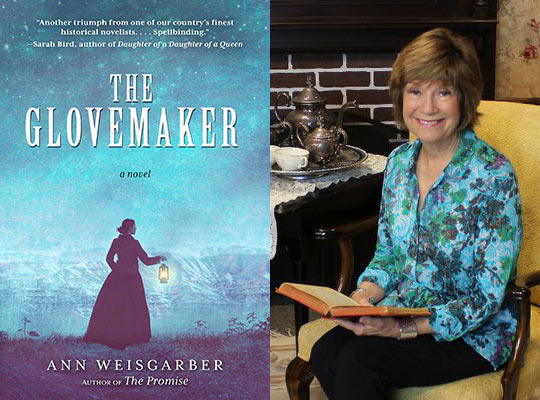 Ann Weisgarber’s The Glovemaker is set in the late 1880s in the Utah territory. The novel captures both the beauty and peril of the natural environment in which the protagonist Deborah lives in a small community of Mormons. While Deborah and her neighbors live outside the official teachings of the Church and do not practice polygamy, fear and memory of Mormon persecution guides their practice of assisting Mormon fugitives. One of these fugitives threatens to break the community apart. With quiet and economical prose, the novel is clear and confident about the “in-between” world it depicts. – V.L.
Ann Weisgarber’s The Glovemaker is set in the late 1880s in the Utah territory. The novel captures both the beauty and peril of the natural environment in which the protagonist Deborah lives in a small community of Mormons. While Deborah and her neighbors live outside the official teachings of the Church and do not practice polygamy, fear and memory of Mormon persecution guides their practice of assisting Mormon fugitives. One of these fugitives threatens to break the community apart. With quiet and economical prose, the novel is clear and confident about the “in-between” world it depicts. – V.L.
– – – – –
Finalist for the 2018 David J. Langum, Sr. Prize in American Historical Fiction is American Princess: A Novel of First Daughter Alice Roosevelt, by Stephanie Marie Thornton
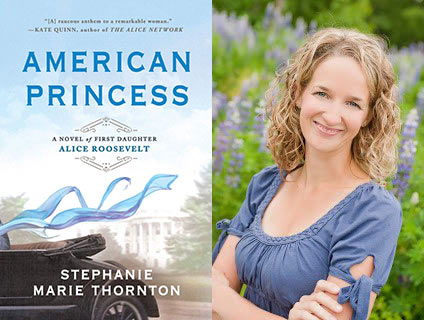 This is a fictional biography of a fascinating woman, Alice Roosevelt Longworth, daughter of Teddy Roosevelt and doyenne of Washington’s social/political life for decades.
This is a fictional biography of a fascinating woman, Alice Roosevelt Longworth, daughter of Teddy Roosevelt and doyenne of Washington’s social/political life for decades.
I generally do not care for fictional biographies because, as an historian, I keep asking myself “how much of this stuff is real?” I never have that perplexing question for novels that I know are entirely made up. Here, however, in an author’s note at the end, Thornton goes to a considerable extent to explain what events she altered a bit, and a few things she made up entirely. And these are not that many.
It is a lively and fascinating read, written in Alice’s own voice, that describes a very raucous and forceful woman, uninhibited to the extent she had an illegitimate child with a married Senator, with whom she was having an affair whilst she herself was married to the Speaker of the House. Thornton is able to use the events of this affair and resulting love child, and other events as well, to build up more dramatic tension than is usual for a biography.
Because Alice Roosevelt Longworth was personally acquainted with many political and business leaders of the world, and because throughout the adult years of her 96 year life she was often involved in considering issues at very high levels, the book is loaded with history, mostly political history but also economic and social history. As the biography is organized chronologically, the history we are given is chronological rather than the analytical history – how things were socially and politically at any given time or place – most common to historical fiction. – D.J.L., Sr.
MAY 15, 2019
The Winner of the 2018 David J. Langum, Sr. Prize in American Legal History is Black Litigants in the Antebellum South, by Kimberly M. Welch (North Carolina).
 Welch’s meticulous research into obscure and tattered court records of the antebellum American South has yielded some surprising results. The title would encompass freedom suits of blacks wrongfully held as slaves and also criminal suits against slaves. Freedom suits are discussed, but her focus is on free persons of color suing whites, for debts, breach of contract, back wages, and the entire range of civil liability.
Welch’s meticulous research into obscure and tattered court records of the antebellum American South has yielded some surprising results. The title would encompass freedom suits of blacks wrongfully held as slaves and also criminal suits against slaves. Freedom suits are discussed, but her focus is on free persons of color suing whites, for debts, breach of contract, back wages, and the entire range of civil liability.
The surprise is that these free blacks suing whites in the antebellum South had no difficulty finding white lawyers to represent them, and that they often won their cases, even when tried by juries. These legal victories over whites, she argues, gave the free black community a small space of agency and self-autonomy. Welch argues that these results demonstrate that the antebellum South valued property rights, even property owned by Negroes, over a total domination of blacks. One could argue further that it demonstrates the value put on legality itself by antebellum whites over a total white supremacy. That is curious because after the War, whites of the South valued their hegemony over blacks more than legality itself (lynching, barriers to black voting, etc.).
Welch appends a harrowing description of the researcher’s difficulties in locating and even reading these obscure records. So it may be narrow-minded to point out that this is only a case study, involving only four counties of Mississippi and Louisiana. But what a stimulus for further work! She points out that many courthouses were burned by invading Union forces, but there must be many other localities where the antebellum court records have survived and could be used to test her findings (Montgomery, Alabama?).
On top of her careful research and stimulating findings, Welch also writes clearly and made her work a pleasure to read. – DJL, Sr.
Two books won Finalist status for the 2018 David J. Langum, Sr. Prize in American Legal History: Child Labor in America: The Epic Legal Struggle to Protect Children, by John A. Fliter (Kansas) and The Sit-Ins: Protest and Legal Change in the Civil Rights Era, by Christopher W. Schmidt (Chicago).
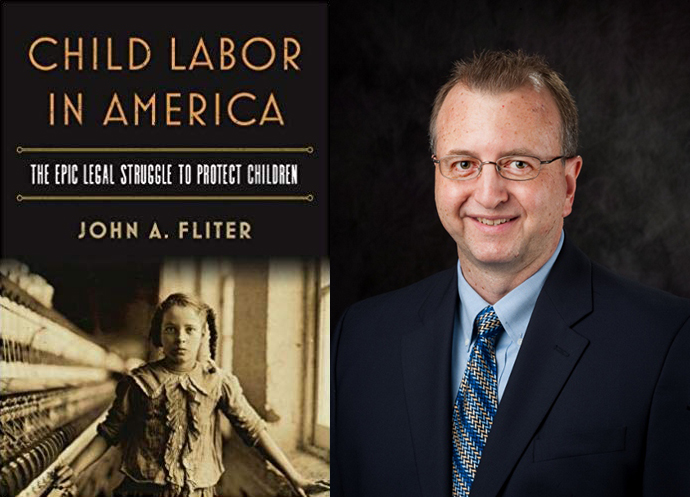 In Child Labor, John A. Fliter comprehensively and vividly chronicles the complex political and constitutional issues involved in what the title so aptly describes as the “epic struggle” against child labor. This carefully researched book offers new insights into many subjects, including the enactment and judicial nullification of the first two federal child labor statutes, the subsequent failure of efforts to add a child labor amendment to the federal Constitution, and the ultimate enactment during the New Deal of a statute that withstood the U.S. Supreme Court’s scrutiny. The book concludes with a survey of recent efforts to roll back these hard-fought reforms. – WGR
In Child Labor, John A. Fliter comprehensively and vividly chronicles the complex political and constitutional issues involved in what the title so aptly describes as the “epic struggle” against child labor. This carefully researched book offers new insights into many subjects, including the enactment and judicial nullification of the first two federal child labor statutes, the subsequent failure of efforts to add a child labor amendment to the federal Constitution, and the ultimate enactment during the New Deal of a statute that withstood the U.S. Supreme Court’s scrutiny. The book concludes with a survey of recent efforts to roll back these hard-fought reforms. – WGR
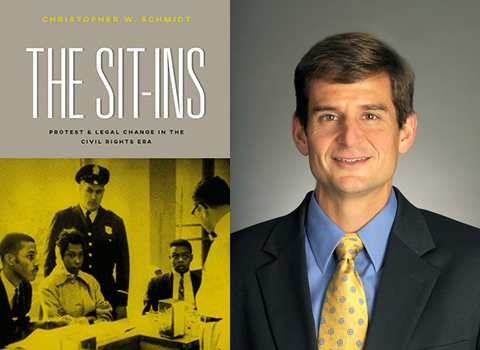 In The Sit-Ins, Christopher W. Schmidt carefully analyzes the early 1960s lunch counter sit-ins, in Greensboro, North Carolina and then sweeping across the American South, from the perspectives of the protesting students, their lawyers, sympathizers, opponents, and the Congress that was then considering civil rights legislation that culminated in the Civil Rights Act of 1964. The book describes the legal difficulty of using the 14th Amendment to protect protestors because the private owners of public accommodations are not the “state actors” that the 14th Amendment was designed to reach. As a result, the monumental 1964 Act was placed under the Congress’s commerce clause powers and not the 14th Amendment. Schmidt pays particular attention to the squabbles within the Supreme Court over the scope of the 14th Amendment in the struggle for equal accommodations, and writes clearly about the legal issues involved. – DJL, Sr.
In The Sit-Ins, Christopher W. Schmidt carefully analyzes the early 1960s lunch counter sit-ins, in Greensboro, North Carolina and then sweeping across the American South, from the perspectives of the protesting students, their lawyers, sympathizers, opponents, and the Congress that was then considering civil rights legislation that culminated in the Civil Rights Act of 1964. The book describes the legal difficulty of using the 14th Amendment to protect protestors because the private owners of public accommodations are not the “state actors” that the 14th Amendment was designed to reach. As a result, the monumental 1964 Act was placed under the Congress’s commerce clause powers and not the 14th Amendment. Schmidt pays particular attention to the squabbles within the Supreme Court over the scope of the 14th Amendment in the struggle for equal accommodations, and writes clearly about the legal issues involved. – DJL, Sr.
MARCH 27, 2019
 The winner of the 2018 David J. Langum, Sr. Prize in American Historical Fiction is Louisa Hall’s Trinity
The winner of the 2018 David J. Langum, Sr. Prize in American Historical Fiction is Louisa Hall’s Trinity
The novel explores Robert Oppenheimer, father of the atomic bomb, through his interactions with seven imagined characters from 1943 to 1966. Speaking in “testimonials,” the characters concentrate more on their own lives despite the major world events unfolding around them. Throughout, Oppenheimer appears familiar yet enigmatic. Excellent historical fiction has the power to reveal emotional truths that history cannot, and Trinity does just that through its ingenious form and compelling prose. – VL.
– – – – –
The Finalist for the 2018 David J. Langum, Sr. Prize in American Historical Fiction is Nick Dybek for his The Verdun Affair (Scribner)
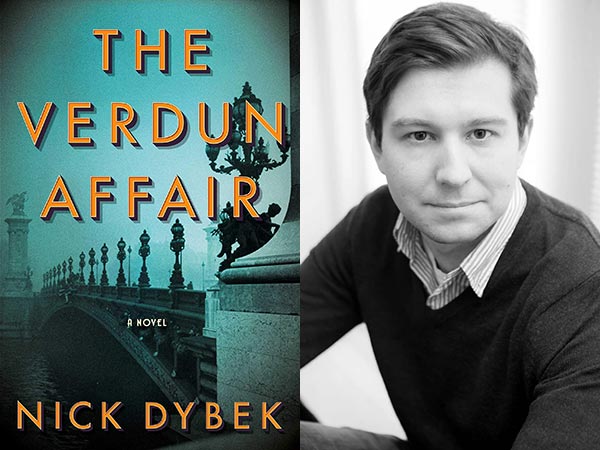 Set in Verdun, France and Bologna, Italy in the aftermath of World War I (with a small portion in 1950s Hollywood, California), the chief protagonists are American. A young man works gathering up bones from the former Verdun battlefield for an ossuary when a young woman arrives in search of information about her husband who was reported missing in action. She was one of many American women who roamed Europe searching for missing husbands in the years following the armistice. The two strike up a romance, and then travel to Bologna where a doctor is treating a mysterious shell-shocked soldier who has lost all memory. Circumstantial evidence suggests he might be the husband. A third major character enters the scene, an Austrian journalist who has his own interest in this mystery man.
Set in Verdun, France and Bologna, Italy in the aftermath of World War I (with a small portion in 1950s Hollywood, California), the chief protagonists are American. A young man works gathering up bones from the former Verdun battlefield for an ossuary when a young woman arrives in search of information about her husband who was reported missing in action. She was one of many American women who roamed Europe searching for missing husbands in the years following the armistice. The two strike up a romance, and then travel to Bologna where a doctor is treating a mysterious shell-shocked soldier who has lost all memory. Circumstantial evidence suggests he might be the husband. A third major character enters the scene, an Austrian journalist who has his own interest in this mystery man.
The book is well-written and a page turner. It has numerous elements of interest: a tender affair, the entry of a competing male, a dreadful description of Verdun following the battle, the mysterious amnesiac and the efforts to restore his memory or otherwise identify him, the chaos in Bologna incident to the early years of the Mussolini movement, and the pervasive effects of a significant mistruth spoken by one of the principal characters. – DJL, Sr.
FEBRUARY 11, 2019
The winner of the 2017-2018 Malott Prize for Recording Community Activism is What the Eyes Don’t See: A Story of Crisis, Resistance, and Hope in an American City, by Mona Hanna-Attisha (One World/Penguin Random House, 2018).
 Mona Hanna-Attisha tells a compelling story of injustice, protest, and partial redemption. She does this as the person most responsible for unearthing the truth about Flint, Michigan’s water crisis. Her highly personal account brings the drama directly to the reader, as she draws on her perspective as a pediatrician caring for the most vulnerable victims of the lead crisis. Hanna-Attisha directly holds the local, state, and national officials responsible for a set of inexcusable decisions.
Mona Hanna-Attisha tells a compelling story of injustice, protest, and partial redemption. She does this as the person most responsible for unearthing the truth about Flint, Michigan’s water crisis. Her highly personal account brings the drama directly to the reader, as she draws on her perspective as a pediatrician caring for the most vulnerable victims of the lead crisis. Hanna-Attisha directly holds the local, state, and national officials responsible for a set of inexcusable decisions.  At the same time, her in-depth account shows the pressures that led officials to systematically undervalue the lives and health of Flint citizens. It is an added bonus that she brings in her family’s experience as immigrants from the Middle East slowly putting down roots in the Midwestern community that is at the heart of the drama. This book is a tribute to Dr. Hanna-Attisha’s skill as an author and an activist. She leaves the reader with no illusions about the entrenched nature of the forces behind the Flint water crisis. Yet this extraordinary book still leaves the reader inspired. – FS
At the same time, her in-depth account shows the pressures that led officials to systematically undervalue the lives and health of Flint citizens. It is an added bonus that she brings in her family’s experience as immigrants from the Middle East slowly putting down roots in the Midwestern community that is at the heart of the drama. This book is a tribute to Dr. Hanna-Attisha’s skill as an author and an activist. She leaves the reader with no illusions about the entrenched nature of the forces behind the Flint water crisis. Yet this extraordinary book still leaves the reader inspired. – FS
The finalist status for the 2017-2018 Malott Prize for Recording Community Activism goes to Unlikely Alliances: Native Nations and White Communities Join to Defend Rural Lands, by Zoltán Grossman (University of Washington Press, 2017).
 The title accurately describes this book’s contents. Native tribes and their non-Indian neighbors often form alliances when they are mutually confronted by an outside threat, for example an oil pipeline, a dam, or a mine.
The title accurately describes this book’s contents. Native tribes and their non-Indian neighbors often form alliances when they are mutually confronted by an outside threat, for example an oil pipeline, a dam, or a mine.  Contemporary conflicts between natives and non-Indians are well-described, but the bulk of the book details the phenomenon of alliances formed after a mutual danger appears. Less commonly, blending of interests can be derived from sources other than an outside threat. For example, the non-Indian population of Wallowa Valley, Oregon has been remarkably facilitative of the Nez Perce tribe’s partial return to their ancestral lands. The non-Indian community stands to gain from the great tourist interest in the Nez Perce and their ceremonies held in Wallowa Valley. The book is well-written and accessible to the educated general reader. For those wanting more detail, copious endnotes are provided. – DJL, Sr.
Contemporary conflicts between natives and non-Indians are well-described, but the bulk of the book details the phenomenon of alliances formed after a mutual danger appears. Less commonly, blending of interests can be derived from sources other than an outside threat. For example, the non-Indian population of Wallowa Valley, Oregon has been remarkably facilitative of the Nez Perce tribe’s partial return to their ancestral lands. The non-Indian community stands to gain from the great tourist interest in the Nez Perce and their ceremonies held in Wallowa Valley. The book is well-written and accessible to the educated general reader. For those wanting more detail, copious endnotes are provided. – DJL, Sr.
JANUARY 29, 2019
The Langum Charitable Trust Changes Its Name
The Langum Charitable Trust is changing its name to The Langum Foundation. However, this change will not be effective on our website, the prizes, or in any of our advertising or publicity until after the current cycle of prizes are awarded, within the next month or so.
MAY 6, 2018
The Winner of the 2017 David J. Langum Sr. Prize in American Legal History Is The Long Reach of the Sixties: LBJ, Nixon, and the Making of the Contemporary Supreme Court, by Laura Kalman (Oxford)
This exuberant book explains how political controversies during the tumultuous Johnson and Nixon presidencies influenced the nomination and confirmation of U.S. Supreme Court justices and permanently transformed Supreme Court appointments process by intertwining it with the political agendas of presidents, Congress, and special interest groups.
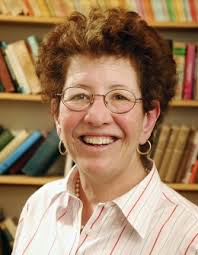 Professor Kalman’s meticulous research introduces newly mined information, fresh insights, and a dazzling array of delicious anecdotes into the controversies that swirled around the Supreme Court appointments of Johnson and Nixon, a subject that already has received substantial attention from historians. She deftly weaves political ideology, party politics, personalities, race, gender, and judicial issues into an exciting account of the forces that influenced the “liberal” appointments of Johnson during the waning years of the Warren Court and the “conservative” appointments of Nixon that attempted, but largely failed, to unravel the decisions of the Warren Court.
Professor Kalman’s meticulous research introduces newly mined information, fresh insights, and a dazzling array of delicious anecdotes into the controversies that swirled around the Supreme Court appointments of Johnson and Nixon, a subject that already has received substantial attention from historians. She deftly weaves political ideology, party politics, personalities, race, gender, and judicial issues into an exciting account of the forces that influenced the “liberal” appointments of Johnson during the waning years of the Warren Court and the “conservative” appointments of Nixon that attempted, but largely failed, to unravel the decisions of the Warren Court.
Although political considerations always have influenced Supreme Court appointments, Professor Kalman explains that presidents beginning with Johnson have been particularly assiduous in attempting to perpetuate their political legacies by nominating men and women whose political views will shape public policy through judicial decisions for decades to come. The rising political stakes of appointments has generated much greater scrutiny of nominees, increased the proportion of controversial nominations, and exacerbated partisanship in the appointments process. – WGR
FEBRUARY 27, 2018
The Winner of the 2017 David J. Langum, Sr. Prize in American Historical Fiction Is Laurel Davis Huber for Her The Velveteen Daughter (She Writes Press)
 Laurel Davis Huber’s Velveteen Daughter composes the documented but unassembled lives of author and artist, as well as mother and daughter Margery Williams Bianco and Pamela Bianco. While Margery Williams Bianco’s Velveteen Rabbit is still cherished by contemporary generations, her daughter Pamela Bianco was arguably more famous in her lifetime. Pamela was a child prodigy discovered in Italy in 1919. After a successful exhibition in London, Bianco gains a patron in Gloria Vanderbilt Whitney who sets the young artist up with a studio and an apartment in New York.
Laurel Davis Huber’s Velveteen Daughter composes the documented but unassembled lives of author and artist, as well as mother and daughter Margery Williams Bianco and Pamela Bianco. While Margery Williams Bianco’s Velveteen Rabbit is still cherished by contemporary generations, her daughter Pamela Bianco was arguably more famous in her lifetime. Pamela was a child prodigy discovered in Italy in 1919. After a successful exhibition in London, Bianco gains a patron in Gloria Vanderbilt Whitney who sets the young artist up with a studio and an apartment in New York.
The novel takes place in the 1940s through 1970s. In the 1940s, we hear the alternating voices of Margery and Pamela during an acute episode of Pamela’s mental illness. Both often allude to the fateful moment when Pamela’s father the bookseller Francesco Bianco enters her into a contest in Turin which serves as the catapult to her international fame. While she is always anxious of her daughter’s celebrity and commissions, Margery is reticent to discourage her husband’s efforts. In the 1970s, Pamela is elderly and largely forgotten by the art world. She has survived one unhappy marriage and one happy one.
The lives of the Bianco family intersect with many artists and authors, some now remembered and some now forgotten. Eugene O’Neill marries and divorces Pamela’s cousin. Pablo Picasso comes to dinner and exchanges drawings with a four-year old Pamela. The Welsh poet Richard (Diccon) Hughes is Pamela’s unrequited and devastating love. While the novel includes vivid scenes of bohemian life both in Wales and Italy, as well as Greenwich Village and Harlem, The Velveteen Daughter is ultimately a novel about the intimate dynamics of familial and romantic love with its myriad expectations and disappointments.
Huber draws on letters and newspapers, and in the notes appended after the novel, carefully delineates fact from fiction. Yet the sources most central to the novel are those created by Pamela and Margery: Pamela’s paintings and Margery’s Velveteen Rabbit. Pamela’s art emerges in exuberant visions. It is spontaneous and joyful, a natural extension of herself. Yet this method does not always please the market, and her father urges her to paint in particular ways that are fashionable at the time to the detriment of her physical and mental health. Yet the velveteen rabbit of Margery’s story becomes real in his loss. So, too, does the Velveteen Daughter become in hers. The narrative ends with plans for a painting “just as I feel. Just as I wish”. — VL
– – – – –
The Finalists for the 2017 David J. Langum, Sr. Prize in American Historical Fiction Are Wiley Cash for His The Last Ballad (Morrow) and Janet Benton for Her Lilli de Jong (Doubleday)
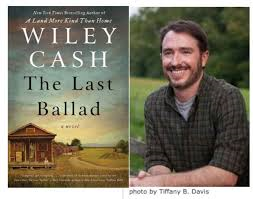 The Last Ballad is a fictionalized biography of Ella May Wiggins, an actual woman, with five children and a husband prone to stray. In the late 1920s she was employed in a carding room of a textile mill located in Bessemer City, North Carolina at the pitiful wage of $9 per seventy-two-hour workweek. Ella and her four children lived in conditions of acute poverty, powerfully shown to us by detailed descriptive writing that is neither angry nor sentimental. Labor unions had just begun to enter the struggle for better conditions in the textile industry. She was attracted to the union movement and began to use her vocal talents by singing at union rallies. Some of Ella May’s songs would later be performed by Woody Guthrie and recorded by Pete Seeger. Eventually, she quit her factory job to work full time for the National Textile Workers Union, a labor organization of the American Communist Party. After a particularly violent labor rally in June 1929, some goons, undoubtedly hired by the owners of the mill, murdered Ella May Wiggins. A precis of this story cannot do justice to the haunting emotions this novel’s lyrical writing evokes in a reader. Highly recommended. – DJL, Sr.
The Last Ballad is a fictionalized biography of Ella May Wiggins, an actual woman, with five children and a husband prone to stray. In the late 1920s she was employed in a carding room of a textile mill located in Bessemer City, North Carolina at the pitiful wage of $9 per seventy-two-hour workweek. Ella and her four children lived in conditions of acute poverty, powerfully shown to us by detailed descriptive writing that is neither angry nor sentimental. Labor unions had just begun to enter the struggle for better conditions in the textile industry. She was attracted to the union movement and began to use her vocal talents by singing at union rallies. Some of Ella May’s songs would later be performed by Woody Guthrie and recorded by Pete Seeger. Eventually, she quit her factory job to work full time for the National Textile Workers Union, a labor organization of the American Communist Party. After a particularly violent labor rally in June 1929, some goons, undoubtedly hired by the owners of the mill, murdered Ella May Wiggins. A precis of this story cannot do justice to the haunting emotions this novel’s lyrical writing evokes in a reader. Highly recommended. – DJL, Sr.
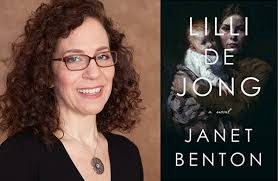 Lilli de Jong tells a sad story that ends well. Lilli becomes pregnant by her well-meaning boyfriend Johan, who intends to marry her. He leaves Philadelphia, where the novel is set, to secure employment in Pittsburgh, unaware that he will soon be a father. Meanwhile Lilli is thrown out of her family home when her pregnancy becomes apparent, and the two lovers are unable to communicate because her father confiscates all incoming mail from the boyfriend, which letters contain his new address. An agent sent by the reimbursement-seeking charity hospital to locate Johan, falsely reports to him that Lilli has married another. Eventually Johan and Lilli reunite under circumstances that try the imagination, but, suspending that, all is well again.
Lilli de Jong tells a sad story that ends well. Lilli becomes pregnant by her well-meaning boyfriend Johan, who intends to marry her. He leaves Philadelphia, where the novel is set, to secure employment in Pittsburgh, unaware that he will soon be a father. Meanwhile Lilli is thrown out of her family home when her pregnancy becomes apparent, and the two lovers are unable to communicate because her father confiscates all incoming mail from the boyfriend, which letters contain his new address. An agent sent by the reimbursement-seeking charity hospital to locate Johan, falsely reports to him that Lilli has married another. Eventually Johan and Lilli reunite under circumstances that try the imagination, but, suspending that, all is well again.
While the couple are separated Lilly has her baby daughter in a charity hospital, refuses the expected gift of the child for adoption. Lilli’s severest trials begin when she is forced to leave the charity. The difficulties facing a single mother in the urban America of 1883 are vividly portrayed. Insult, sexual harassment, theft, lack of employment opportunity all face this determined mother as she is forced to sleep with her daughter in filthy alleys and train stations. It is a stinging indictment of self-righteous bourgeois America that makes 1883 seem worse than but still close to our own day. – DJL, Sr.
– – – – –
I would like to informally discuss four books in lieu of the formal Director’s mentions of previous years. The Twelve-Mile Straight, by Eleanor Henderson (Ecco) is a Southern saga set against the background of Prohibition and the Depression. It is a grim work whose characters experience few transient joys and no enduring happiness. The novel has a remarkable structure, a Roshomon-like style where new interpretations open up as the novel progresses and our understanding of past events become subject to change or major alteration. It reminded me a bit of Lawrence Durrell’s The Alexandria Quartet in that regard, although Twelve-Mile Straight lacks the pleasures and passions of Durrell’s work.
It is not an absolutely novel thing for characters with disabilities to appear in historical fiction. The winner of our own 2014 prize, What is Visible by Kimberly Elkins, had a protagonist, the actual Laura Bridgman, who had been stripped of sight, hearing, taste, and smell by childhood scarlet fever. Even so, disabilities seldom appear in historical fiction, and it is notable that three novels of the past season feature them.
A Piece of the World by Christina Baker Kline (Morrow) is an excellent fictional biography of Christina Olson that describes her relationship with her family and their familial relationship with the famed artist Andrew Wyeth. Christina suffered from a progressive muscular disease that rendered her unable to walk, but was made famous in a sense by Wyeth’s use of her as a model for the famous painting “Christina’s World.” In Manhattan Beach by Jennifer Egan (Scribner), a significant character suffers from major muscle malfunctions, is quadriplegic, and can vocalize only poorly. Although she is only a secondary character, we do read of her impact on her family and on her sister, who is the protagonist. The debility is not named but is undoubtedly cerebral palsy. All She Left Behind by Jane Kirkpatrick (Revell), features a protagonist with a reading disability that she successfully overcame over the course of her life. Not named, it surely is dyslexia.
FEBRUARY 18, 2018
The Langum Foundation is pleased to present the 2017 short list for its 2017 David J. Langum, Sr. Prize in American Historical Fiction.
- Barren Island, by Carol Zoref (Western Michigan University)
- Lilli de Jong, by Janet Benton (Doubleday)by
- The Last Ballad, by Wiley Cash (Morrow)
- The Velveteen Daughter, by Laurel Davis Huber (She Writes Press)
- A Piece of the World, by Christina Baker Kline (Morrow)
- The Twelve-Mile Straight, by Eleanor Henderson (Ecco)
- Manhattan Beach, by Jennifer Egan (Scribner)
We will announce the winner and finalists in approximately two weeks on our website.
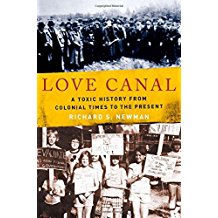 The Langum Foundation is pleased to announce that the winner of the 2015-2016 Malott Prize for Recording Community Activism is Love Canal: A Toxic History from Colonial Times to the Present, by Richard S. Newman (Oxford University Press, 2016).
The Langum Foundation is pleased to announce that the winner of the 2015-2016 Malott Prize for Recording Community Activism is Love Canal: A Toxic History from Colonial Times to the Present, by Richard S. Newman (Oxford University Press, 2016).
According to DJL, Sr., “The book is a pleasure to read. Clearly written, it covers more than the Love Canal crisis itself, and contains a generous helping of the history of early European activity in the region, then the building of the canal, the Hooker Chemical era, and the subsequent residential development and chemical leachate that generated the crisis.”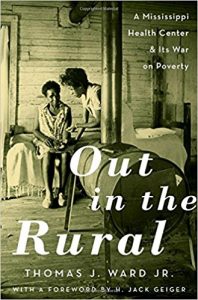
The finalist for the 2015-2016 Malott Prize for Recording Community Activism is Out in the Rural: A Mississippi Health Center and Its War on Poverty, by Thomas J. Ward (Oxford University Press, 2016).
Says DJL, Sr., “Reading this well-written and readable book leaves somewhat of a bittersweet taste. It was a noble task to build up all these far-flung programs to aid the rural and poor Mississippians. Yet the administrative strife and economic collapse that brought about considerable contraction in the 1970s is also disheartening. It is an interesting read.”
 The Langum Foundation is pleased to announce that
The Langum Foundation is pleased to announce that 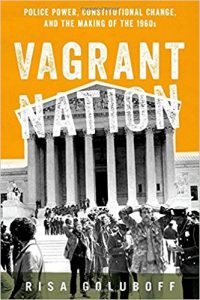 the winner of the 2016 David J. Langum, Sr. Prize in Legal History/Biography is Risa Goluboff for Vagrant Nation: Police Power, Constitutional Change, and the Making of the 1960s (Oxford University Press).
the winner of the 2016 David J. Langum, Sr. Prize in Legal History/Biography is Risa Goluboff for Vagrant Nation: Police Power, Constitutional Change, and the Making of the 1960s (Oxford University Press).
Says DJL, Sr., “This excellent book is well-written and clearly accessible to the general educated reader. In addition the author has provided an abundance of historical and cultural context for the 1960s, so the reader is able to understand the operation of the vagrancy laws and their destruction as an integral part of the times.”
Two books also won Finalist status for the 2016 David J. Langum, Sr. Prize in American Legal history: Ballot Battles: The History of Disputed Elections in the United States, by Edward B. Foley (Oxford University Press) and The Great Yazoo Lands Sale: The Case of Fletcher v. Peck, by Charles F. Hobson (University Press of Kansas).
The Langum Foundation is pleased to announce its shortlist for the 2016 Langum Prize in American Legal History/Biography. The final decision will be announced online in about one month. The shortlisted books are:
- Ballot Battles: The History of Disputed Elections in the United States, by Edward B. Foley (Oxford University Press).
- Discrediting the Red Scare: The Cold War Trials of James Kutcher, “The Legless Veteran,” by Robert Justin Goldstein (University Press of Kansas).
- The Great Yazoo Lands Sale: The Case of Fletcher v. Peck, by Charles F. Hobson (University Press of Kansas).
- Vagrant Nation: Police Power, Constitutional Change, and the Making of the 1960s, by Risa Goluboff (Oxford University Press).
 The Langum Foundation is pleased to announce that the winner of the 2016 David J. Langum, Sr. Prize in American Historical Fiction is Michele Moore for her book The Cigar Factory (Univ. of South Carolina Press).
The Langum Foundation is pleased to announce that the winner of the 2016 David J. Langum, Sr. Prize in American Historical Fiction is Michele Moore for her book The Cigar Factory (Univ. of South Carolina Press).
The Cigar Factory describes the lives of two families, one black, one white, in Charleston during the years 1917-1946. Says DJL, Sr., “The author describes the difficult lives of these two families, both joys and sorrows, with great sensitivity and beauty.”
 The finalist for the 2016 David J. Langum, Sr. Prize in American Historical Fiction is Chad Dundas for his Champion of the World (Putnam).
The finalist for the 2016 David J. Langum, Sr. Prize in American Historical Fiction is Chad Dundas for his Champion of the World (Putnam).
Says Virginia Langum, “This debut novel portrays the world of American wrestling in the 1920s, when wrestling was more science than show … Dundas’s training as a sports journalist shines through in the suspense of his scenes, in and out of the ring.”
The Langum Foundation is pleased to announce the honorees of the 2015 David J. Langum, Sr. Prize in American Legal History/Biography.
David J. Langum, Sr. Prize for American Legal History/Biography, Winner for 2015:
Who Freed the Slaves? The Fight over the Thirteenth Amendment, by Leonard L. Richards (University of Chicago Press), wins the David J. Langum, Sr. Prize in American Legal History for 2015. Richards vividly describes the messy process of the Congressional adoption of the Thirteenth Amendment before its submission to the states for ratification. Many today think that this amendment was simply an inevitable culmination of the Emancipation Proclamation, but that thought is incorrect. Even in the final stage of the Civil War, many opposed an outright ban on slavery. Richards explains this opposition and brings forward forgotten figures, such as Congressman James Ashley of Ohio, who were far more influential in securing the passage of the Amendment than Lincoln, who actually dragged his feet until the last moment before passage. Clearly and engagingly written, Richards has also based his work on sound scholarship exhibited in extensive endnotes. – DJL, Sr.
David J. Langum, Sr. Prize for American Legal History/Biography, Honorary Mention for 2015:
The 2015 Honorable Mention for American Legal History/Biography goes to Nancy Woloch’s A Class by Herself: Protective Laws for Women Workers, 1890s-1990s (Princeton University Press, 2015). Professor Woloch meticulously examines the complex political, constitutional, and social forces that contributed to the rise and fall of Progressive Era gender-specific legislation to protect the health and safety of women through minimum wages, maximum hours, and regulation of workplace conditions. The book traces the intense controversy over such laws among advocates of women’s rights, who increasingly believed that they hindered rather than promoted the interests of women by reinforcing gender distinctions and impeding equal rights. The book also explains how protective laws for women helped pave the way for similar measures for all workers during the Progressive Era and the New Deal. – WGR
The Langum Foundation is pleased to announce the honorees of the 2015 David J. Langum, Sr. Prize in American Historical Fiction.
David J. Langum, Sr. Prize for American Historical Fiction, Winner for 2015:
Good Night, Mr. Wodehouse by Faith Sullivan (Milkweed)
Good Night, Mr. Wodehouse is an exquisite gem. Nell Stillman, the protagonist, is an Everywoman. She lived almost her entire adult life in an apartment above a meat market in the small town of Harvester, Minnesota. Widowed at age 24 with an infant, Nell became the third grade teacher of the town’s school for 37 years. Almost nothing in the large scale of life occurred to Nell, yet many chaotic events in everyday life challenged her. Nell’s son returned shell-shocked from World War I; a young woman she nurtured became pregnant and left the small town in disgrace; some in the town blamed Nell for her charge’s disgrace; and Nell herself found love late in life with a fine man who died just before their scheduled marriage.
Aside from her own grit and independence, Nell had three other means of coping with life. The first was her small number of excellent friends. The second was the love she shared with a man over many years, yet blasted away by her lover’s untimely death. The third, and most important, was her love of reading. She read many novelists but fell in love with the novels of the British writer P.G. Wodehouse. She found time every evening to read, and, in a major theme of this book, Nell had the strength to carry on through the transformative power of reading.
The time of Nell’s adult life, c. 1900-1961, saw many historical changes of significant character, for example, numerous improvements in appliances and other implements of women’s work, W.W.I, women’s suffrage, electrification, prohibition, W.W.II, and so on. The book does not neglect these historical events but presents then from the satisfying perspective of what they meant to this little town, and what they meant to Nell Stillman. Highly recommend. – DJL, Sr.
David J. Langum, Sr. Prize for American Historical Fiction, Honorary Mention for 2015:
The Race for Paris by Meg Waite Clayton (Harper)
Inspired by true events and historical figures, the author tells the overlooked story of World War II female war correspondents and their quests to be the first to report the Allied liberation of Paris. This powerful story sweeps the reader into the front lines of battle where conditions for the correspondents are nearly as stark and dangerous as they are for the troops. Well researched and rich with vivid descriptions of wartime France, Clayton skillfully keeps the focus on the characters’ ambitions and personal dilemmas. Yet, the messiness and horror of war never leave the page. Layered with complicated relationships and motives, this gripping story about the correspondents’ quest to record events while dealing with their own quandaries fully engages the reader.
What especially sets The Race for Paris apart is its fresh examination of female correspondents in the front lines. Many novelists have written about World War II, but Meg Waite Clayton brings a new perspective not only to the war but to the risks endured by journalists and photographers. – AW
The Langum Foundation Is Pleased to Announce the Winners of the Malott Prize for Recording Community Activism for 2013-2014
The bi-annual Malott Prize is awarded to the best book, article, or film that depicts an individual or small group of people striving to make a significant improvement or prevent a significant harm to their local community.
The winner of the 2013-2014 prize is Will Harlan for his book Untamed: The Wildest Woman in America and the Fight for Cumberland Island (New York: Grove Press, 2014). This engaging biography of Carol Ruckdeschel vividly describes her fight to save the Georgia island on which she lives from development and its sea turtles from extinction. This has not been a polite society lady’s conflict, but a passionate down-in-the-dirt confrontation with the powers that be, conducted over a long span of years. Untamed combines a topic of considerable interest with vibrant writing. – DJL, Sr.
Honorable mention for 2013-2014 goes to Marta Gutman for her A City for Children: Women, Architecture, and the Charitable Landscapes of Oakland, 1850-1950 (Chicago: University of Chicago Press, 2014). A combination of women’s strong wills and sense of civic spirit led many Oakland, California women and women’s groups to play a dominant role in the founding and shaping of charitable institutions designed to aid children. This sophisticated academic work provides nuanced and innovative study of an intersection between charity and gender at the end of the nineteenth and beginning of the twentieth centuries. – DJL, Sr.
David J. Langum, Sr. Prize for American Legal History/Biography, Winner for 2014:
The winner of the David J. Langum, Sr. Prize in American Legal History/Biography for 2014 is Baseball on Trial: The Origin of Baseball’s Antitrust Exemption, by Nathaniel Grow (University of Illinois Press). This book describes in rich detail the rivalry and litigation between the three American baseball leagues in the early twentieth century: the upstart Federal League and the better-established American League and National League. Through a complex set of personalities, deals, and litigation, all of which Grow well chronicles, the issue of whether the leagues were subject to the federal anti-trust laws was ultimately presented to the United States Supreme Court in the landmark case of Federal Baseball Club of Baltimore v. National League of Professional Baseball Clubs, decided in 1922. It certainly seemed as though the leagues were anti-competitive. They controlled many phases of baseball including hiring, salaries, movement of players from one team to another, even the sale of teams. Yet Justice Oliver Wendell Holmes writing for the Court concluded that baseball was not even interstate commerce, notwithstanding the regular crossing across state lines for teams to play one another. This story constitutes the major portion of Grow’s work.
A rushed epilogue traces the later judicial treatment of this exemption, and the impact of collective bargaining, but lacks discussion of Congress’s belated entry into the arena through its curiously limited Curt Flood Act of 1998.
Of particular interest is the skill with which Grow delineates the trial strategies of counsel, discussing several weaknesses in the way the plaintiff’s case was presented. He is kind to Justice Holmes in reminding the reader that the huge apparatus of interstate television, radio, and advertising for baseball simply did not exist in 1922, and it was possible with a straight face to claim that professional baseball was not engaged in interstate commerce. – DJL, Sr.
David J. Langum, Sr. Prize for American Legal History/Biography, Honorary Mention for 2014:
The 2014 honorable mention for American Legal History/Biography goes to Her Honor: Rosalie Wahl and the Minnesota Women’s Movement, by Lori Sturdevant (Minnesota Historical Society Press). This engaging biography of Rosalie Wahl (1924-2013), who in 1977 became the first woman to serve as a justice of the Minnesota Supreme Court, provides a comprehensive account of the life and accomplishments of an important jurist. It also offers significant insights into the struggles of women to erode gender barriers in the legal profession and in politics in Minnesota and throughout the nation during a period of rapid social change. – WGR
The Langum Foundation is pleased to announce the honorees of the 2014 David J. Langum, Sr. Prize in American Historical Fiction.
David J. Langum, Sr. Prize for American Historical Fiction, Winner for 2014:
What is Visible by Kimberly Elkins (Twelve)
This novel lyrically revives a significant and intriguing figure in the history of disability. Laura Bridgman (d. 1889) was a celebrity in her lifetime. Stripped of sight, hearing, taste and smell by scarlet fever in her childhood, Bridgman served as a poster child for the Perkins School for the Blind and various intellectual causes such as phrenology and anti-Calvinism.
Laura’s desperate need to command attention and to please others conflicts with her desire for a private life distinct from any larger cause. Through meticulous archival and imaginative labor, Elkins provides Bridgman with an inner life that offers a daring and convincing account of a woman who observes and communicates only through touch. As the author articulates in the appendix, the novel concerns “what might have happened as well” rather than “what might have happened instead.” Following this method, Elkins attends to Bridgman’s parameters for pleasure, longing, deprivation and defiance with a narrative voice that evokes sympathy without sentimentality.
Most of the novel gathers snugly around Bridgman’s life and perceptions, interspersed with the perspectives of those around her. In addition to the host of passing contemporary notorieties, such as Charles Dickens, who visit and comment upon her, Bridgman’s life intersects with prominent figures in more sustained ways. These include her doctor Samuel Gridley Howe, the poet Julia Ward Howe, and even the abolitionist John Brown.
What sets this novel apart is the author’s ability to imagine Laura Bridgman’s world and to give her a powerful narrative voice. With skill and compassion, Elkins portrays Bridgman as a complicated character whose strengths and flaws grow more complex as the story progresses. Historical details enrich the story, and the author deftly exposes the care and treatment of the disabled during the 1800s. This is American historical fiction at its best. – VL
David J. Langum, Sr. Prize for American Historical Fiction, Honorable Mention for 2014:
Rush of Shadows by Catherine Bell (Washington Writers’ Publishing House)
Small farmers in the coastal hills of Northern California’s Sacramento Valley and the indigenous Digger Indians they encountered in the 1850s are the moving forces in this sparsely but beautifully written novel. While there are fine passages describing the beauties of the land and the methods adopted by these pioneers for shelter, food, and formation of communities, the major theme is the relationship of these farmers with the local Indians.
The Indians of Northern California were wholly unlike their heartier cousins of the plains or the deserts. Americans referred to them as “diggers” because the beneficent California climate permitted them to thrive by gathering up roots and seeds coupled with minimal hunting. Their primitive technology rendered them absolutely defenseless against the invading hoard of Americans who, wanting their lands for conventional farming, raped and murdered the Diggers, stole their lands, and herded the survivors onto miserable reservations.
The book’s chapters are told from the perspectives of different characters, although dominated by Mellie, wife of an American settler, and Bahé, granddaughter of the Indian band’s shaman. Tension mounts throughout the book, and the ultimate outcome comes dramatically but without sentiment. The characters are drawn well, two of them beginning with strong anti-Indian feelings that soften over time. In the hands of a lesser writer, Mellie could have become a stock character of a strong woman who saves the tribe from removal. Here, more sensitively and more realistically, her influence is smaller and more personal: providing medicine for one Indian child, a job for one woman, and a warning about an impending capture. Bahé is even more delicately drawn as a strong woman who realizes the futility of fighting the white man, but who draws on her inner strength as the new spiritual leader of her band to accommodate and preserve as much of the old ways as is possible.
This is truly fresh material. The Trail of Tears is well-known, but Indian removals in California are relatively obscure. The characters are well-drawn and the descriptions vivid. A beautiful book. – DJL, Sr.
David J. Langum, Sr. Prize for American Historical Fiction, Director’s Mention for 2014:
The Moor’s Account by Laila Lalami (Pantheon Books)
While The Moor’s Account does not fully meet the requirements for the prize, the Director commends this excellent novel.
“It was the year 934 of the Hegira, the thirtieth year of my life, the fifth year of my bondage – and I was at the edge of the known world.” So begins this extraordinary, pitch-perfect work of historical fiction about the Narváez expedition in Florida. The narrator is Mustafa al-Zamori, a slave from Azemmur whom the Castilian explorers call Estebanico. Mustafa, one of four expedition survivors and who is haunted by his own demons, tells an unvarnished account of the exploration of Florida and the Southwest. The 600-man expedition (1528-1536) is a disaster from the moment the ships arrive on the Gulf Coast. The leaders engage in power struggles, the expedition gets lost, and within a few years all but four men are dead from accidents, starvation, and disease. These survivors cross all the way along the southern border of the present United States, from Florida to Mexico. The expedition’s encounters with native peoples are equally harrowing. Mustafa’s account painfully foreshadows the future of Native Americans.
The novel is rich with moral quandaries about what people will do to survive. The author’s attention to historical and ethnological detail is remarkable as is the scope of the story which covers Africa, Spain, and the New World, including Mexico. Yet the details never slow the pace or the excitement of the story.
What especially sets The Moor’s Account apart is the author’s ability to bring alive an extraordinary piece of history told by an overlooked narrator. – AW
Langum Prize for American Legal History/Biography for 2013
The winner for 2013 is Obscenity Rules: Roth v. United States and the Long Struggle over Sexual Expression, by Whitney Strub (University Press of Kansas). This long title is perfectly appropriate since the book covers far more than its principal case, although it does discuss Roth well and in detail. However, the book also analyzes American attitudes and law regarding obscenity from our colonial times to the present. In doing so its scope extends well beyond the time of Roth in 1957 to porno chic and the disparate feminist interpretations of pornography of the 1960s and 1970s and beyond to the present. A great virtue of Strub’s work is that he brings in a great variety of background factors, including changing social mores and even changes in technology, to inform our understanding of changes in legal norms regarding obscenity, a legal term, and pornography, a cultural construct. – DJL, Sr.
Honorary Mention Langum Prize for American Legal History/Biography for 2013
The 2013 honorable mention for American legal history goes to Father, Son, and Constitution: How Justice Tom Clark and Attorney General Ramsey Clark Shaped American Democracy (University Press of Kansas). The author, Alexander Wohl, has thoroughly and engagingly explained how Tom C. Clark and his son Ramsey Clark made enduring contributions to American constitutional law, especially in cases involving civil rights, free speech, personal privacy, and presidential power. Both were united in their dedication to the freedom of citizens from intrusive government, despite differences that reflected their personalities, interests, and the times in which they worked. Wohl shows how the elder Clark accomplished many of his goals through established institutions while his more iconoclastic son often initiated bold actions to challenge injustices. Wohl’s highly contextual work offers fascinating insights into the Supreme Court during Tom Clark’s tenure from 1949-1967 and the Johnson Administration during Ramsey Clark’s service as U.S. attorney general from 1967-1969. – WGR
The Langum Foundation Releases Readers Guidelines for the David J. Langum, Sr. Prize in American Historical Fiction
The Langum Foundation has posted the guidelines used by our readers and by our selection committee, giving more flesh to the basic requirement that our winning novel must be both excellent history and excellent fiction. Click here to review our guidelines.
The Langum Foundation Is Pleased to Announce the Winners of the 2013 David J. Langum, Sr. Prize in American Historical Fiction.
We are pleased to announce the winner of the 2013 David J. Langum, Sr. Prize in American Historical Fiction: Gary Schanbacher for his Crossing Purgatory (Pegasus Books). Honorable Mentions include Pamela Schoenewaldt for her Swimming in the Moon (Morrow) and Christine Wade for her Seven Locks (Atria). Click here to read complete commendations.
The Langum Foundation is Pleased to Announce the Shortlist of the First Half of 2013 for the David J. Langum, Sr. Prize in American Historical Fiction
The Blood of Heaven by Kent Wascom (Grove Press)
Crossing Purgatory by Gary Schanbacher (Pegasus Books)
Seven Locks by Christine Wade (Atria Books)
The Son by Philipp Meyer (Ecco)
Once Again Random House Censors Books
In 2008 the publisher Random House self-censored for political reasons by refusing to publish Sherry Jones’s The Jewell of Medina, even though it had thoroughly vetted the manuscript and paid a substantial advance. The reason was political: the book might offend some in the Muslim community. Five years later it has committed the same offensive act by backing out of the publication of the latest cookbooks of Paula Deen, the Southern food maven.
A few weeks ago Paula Deen admitted in a deposition that thirty years ago she had used the infamous n-word. Immediately, the political correctness crowd denounced her. Business after business tossed red meat to this mob while it undulated in a frenzied dance, chanting “She used the n-word! She used the n-word!” The cable company that carried her cooking show dropped her, as did many retailers who carried her products or were her sponsors, such as Sears, J.C. Penny, Walgreen, Wal-Mart, Target, and Home Depot.
It would seem that this constituted vastly disproportionate punishment for a one time use of the n-word thirty years ago. Yet it really did not touch upon the work of our foundation until late June when Random House determined to yank the publication of her latest cookbook, Paula Deen’s New Testament, scheduled for October 2013 as well as four additional books for which she was under contract.
Her book was running very high in advance sales; indeed, it was the number one seller on the Amazon list of advance sales and continued so well after the n-word revelation. We cannot pretend that it was a fear of economic backlash that motivated Random House. It was simply a political decision to appease a particular mob and an act of cowardly self-censorship. This represents a threat to all literature, not merely cookbooks.
Back in 2008 we imposed a boycott on Random House for consideration of their books for our prizes until The Jewel of Medina was published by a different publisher. Our action received a lot of notice, both of praise and criticism, but the only critique that made sense to us was that it might be unfair to authors whose books were already in the process of publication by Random House. So today we announce a two-year boycott on all imprints of Random House/Penguin for consideration for our prizes, but to take effect prospectively, on July 1, 2014, all books published prior to that date remaining eligible.
The Langum Foundation Is Pleased to Announce the Winners of the Malott Prize for Recording Community Activism for 2011-2012
The bi-annual Malott Prize is awarded to the best book, article, or film that depicts an individual or small group of people striving to make a significant improvement or prevent a significant harm in their local community. For the years 2011-2012 two works commanded our attention, and it was very difficult to compare the qualities of their depictions of community since one is a book and the other a film. After agonizing for several weeks, we ultimately determined to award the prize to both.
One winner of the Malott Prize for 2011-2012 is Jay Erskine Leutze for his Stand Up that Mountain: The Battle to Save One Small Community in the Wilderness Along the Appalachian Trail (New York: Scribner, 2012). Belview Mountain in the North Carolina Appalachians was threatened by a developer’s desire to gash and level a large portion of the mountain to extract granite to be made into gravel. A small group of local people, worried about the stability of their homes from blasting and the impact of the development on their water and way of life, entreated the author, a non-practicing lawyer, to spearhead the opposition to the development, for which a permit had already been issued. Leutze took the lead initially, but wisely later hired seasoned lawyers with political connections to take over the struggle.
Leutze clearly and engagingly describes all the levels of bureaucratic and courtroom struggle his little band went through, but it would be wrong to think of this book as a mere summary of legal fortitude. He spends equal attention to the persons and personalities of the mountain folk who are struggling to save their homes and community and writes of them and their culture with a sympathetic and light touch. The discovery that the eyesore to be created by the development would be clearly visible from the Appalachian Trail significantly aided the equities of their cause.
Adele Malott was convinced, as she wrote herself, that “at democracy’s heart are people who find themselves agitating for change to make things better, repair something that has broken down or create new solutions for old problems. Such changes do not come easily. Nor without pain.” She was fascinated by the motivations of quite ordinary people who “found themselves in circumstances that pulled them out of the crowd and caused them to speak up,” even as neighbors judged them busybodies and politicians judged them troublemakers.
She wanted the prize-winning accounts to focus on activists, even more than their causes, to show us “what pushed him/her to get off the coach and spend hours at countless meetings trying to be heard, trying to persuade people to help pick up the load and move toward a solution. We should be seeing things through this activist’s eyes.” And in Stand Up that Mountain we do see this in a first-hand account by the primary activist himself, through all the twists and turns of tactics, hearings, and personalities, but written with a light-handed entertaining touch.
Other winners of the Malott Prize for 2011-2012 are Steve James and Alex Kotlowitz, the makers of The Interrupters (Kartemquin Films, 2011), a film that tells the story of CeaseFire, now re-named Cure Violence, a private non-profit organization that seeks to minimize street violence in the toughest neighborhoods of large urban communities. Cure Violence regards violence as an infectious disease, and with that premise it (1) detects and interrupts outbreaks of the disease, i.e., shootings and other fights; (2) determines what individuals are at risk for perpetrating violence, e.g., recent releases from prison, and attempts to modify thinking and behavior to reduce the probabilities of violence; and (3) tries to change underlying social and behavioral norms on the community level.
To accomplish these objects Cure Violence recruits young men and women to intervene in situations that might create violence and persuade those involved of the futility of that course of conduct. They also work with persons with very high risk, teenagers recently ejected from schools or homes or released from prison or whose sibling has recently been killed in street violence, trying to alleviate the poverty, alienation, or anger that might lead to violence. Cure Violence, tries to recruit its Interrupters from among young people who themselves have past histories of addiction, violence, and prison to increase their street credibility among those they serve.
The film The Interrupters spends some but little time with the philosophical premises of the organization, and instead focuses on three specific interrupters, a Black Muslim woman, and two men, one black and other Hispanic, and their work in Chicago neighborhoods. The strength of the film is that the viewer is shown detail about these very personable protagonists. We meet their families, and learn of their own backgrounds and what it was that turned their lives from violence. Then we see their actual work with disaffected youth who seem primed for shooting someone or other anti-social activity. We see many successes and a few failures. But the interrupters themselves stay upbeat and focused on their work. The viewer wants very much for them to succeed.
2012 Langum Prize in American Legal History/Biography:
The winner of the 2012 David J. Langum, Sr. Prize in American Legal History or Biography is Samuel Walker for his Presidents and Civil Liberties from Wilson to Obama: A Story of Poor Custodians (Cambridge: Cambridge University Press, 2012). This work is a tour de force that that discusses virtually every significant event, judicial decision, or government activity affecting civil liberties in America from 1913 (Wilson’s inauguration) to 2009 (Obama’s inauguration). Organized primarily by Presidential actions or reactions, the author analyzes each President by his civil rights record, and, finding them all to be lacking, concludes with the subtitle of the book, that on the whole they have been poor custodians of Americans’ civil liberties.
This is no dry discussion of changing legal doctrine. As appropriate, Walker is careful to bring to the discussion how changes in the economy, public opinion, social conditions, wartime fears, and protests have been inextricably involved with the expansion and contraction of civil rights. He brings a generally liberal and civil-libertarian outlook to his work, and is candid to disclose that he has had thirty years of involvement with the ACLU. Nonetheless, he is scrupulously fair. Where Presidents generally thought of as conservative did something favorable to civil liberties he describes it and renders praise. An example of this is President Harding’s pardon of Eugene Debs, a notable victim of Wilson’s World War I suppression of free speech. Likewise where Presidents generally thought of as liberal did something unfavorable to civil liberties, he describes that too and criticizes. An example of this is President Truman’s Loyalty Program and its use of guilt by association. He makes a clear case that disrespect for civil rights is nonpartisan.
General readers should not be discouraged by the footnotes being placed where they should be positioned for convenience of reference: at the foot of each page. Although many facts and much history are packed within this 510 page volume, Walker has written an extremely readable account. DJL, Sr.
2012 Honorary Mention Langum Prize in Legal History/Biography:
Honorable mention goes to R. Kent Newmyer for his The Treason Trial of Aaron Burr: Law, Politics, and the Character Wars of the New Nation (Cambridge: Cambridge University Press, 2012). This short well-written volume focuses, as implied by the title, on the trial of Aaron Burr for treason and high misdemeanor. Newmyer only briefly discusses background: the confusing facts of the alleged conspiracy to break off western portions of the nation, the motivations for Jefferson’s denunciation of Burr, or the puzzling aspects of the prosecution (especially why Burr was not charged with a much more easily proven violation of the Neutrality Act in addition to the difficult Treason and High Misdemeanor charges). Instead, Newmyer concentrates on the pretrial activities and trial itself. Although the trial did much to elucidate the American law of treason, it cannot be said to have resolved the factual issues that lay behind the conflict. What Burr was really up to may always remain shrouded in mystery, and in our confusion we can take some comfort with the fact that it was equally confusing to the contemporaries of the events. DJL, Sr.
The Langum Foundation Announces Winner of the David J. Langum, Sr. Prize for American Historical Fiction for 2012
The Cove, by Ron Rash (New York: Ecco, 2012). This powerful and atmospheric novel takes place in the North Carolina mountains during the final year of World War I. The story revolves around a sister and brother, Laurel and Hank, whose family home in an isolated cove is darkened by cliffs, ridges, and local superstitions. Both are wounded people. Hank lost part of an arm while serving in the army in France. Laurel has a birthmark on her shoulder and neck, and is feared and ostracized by the community. Their lives change when they take in a stranger who plays the flute but does not speak.
The Cove is American historical fiction at its best. The writing is lyrical and the novel is rich with symbolism, yet the prose does not overshadow the story. Rash’s use of regional language adds depth to the characters and never strays toward ridicule. Small details – a flour-cloth dress, a hearing machine with wires and a dial, wagon and automobile tracks on the same road – speak to time and place. With a light touch, Rash balances anti-German sentiment and America’s increasing impatience with the war. The sense of doom established in the prologue heightens with each ensuing scene until the novel ends with a satisfying conclusion.
There is much to commend about The Cove. For the purposes of this prize, its remarkable achievement is the insight into a little known historical event: the seizure of the German ocean liner, the Vaterland, and the placement of its crew in a North Carolina internment camp. A.W.
David J. Langum, Sr. Historical Fiction Honorable Mention for 2012
Slant of Light: A Novel of Utopian Dreams and Civil War, by Steve Wiegenstein (Saint Louis: Blank Slate Press, 2012). This well-written debut novel describes the travails of a utopian colony in southern Missouri during the late 1850s. At a deeper level it is also a meditation on the decline of order – social order, sexual order, and political order – all clearly delineated but with no causal explanation other than “homo homini lupus.” Man is a wolf to man, and probably an ample reason.
James Turner is an itinerant lecturer, expounding on the merits of a proposed utopian community to be founded on the principles of democracy, balance, trust, openness, and harmony. A farmer in southern Missouri offers him land, and Turner and his small band of followers begin their agricultural settlement. Turner’s wife Charlotte at first is a somewhat quiet character, but over time and tribulations becomes more forceful. Soon a philosophical Adam Cabot, an abolitionist, joins their settlement. Much of the novel traces the community’s efforts, failures, and successes.
Social order, at least as defined by the founding principles, breaks down very quickly. Largely because of the recalcitrance of a small number of the colonists, Turner increasingly imposes his will in community meetings, employing deception, secrecy, and sometimes force. Sexual order is threatened by Charlotte’s valiant struggle to keep her deep attachment to Adam on a platonic basis. James succumbs fairly easily to the allurements of a young colonist, Marie, and is caught by his wife.
The collapse of political order arrives with the coming of the Civil War. Missouri is a border state with bitter feelings on both sides of secession and slavery, and also the need to fight for either. The membership of the colony itself is divided. Turner struggles to maintain the group’s neutrality, but ultimately more and more members leave the join the fighting, and the settlement is left in virtual suspension, with only Charlotte to hold on. Wiegenstein handles the coming of the Civil War adroitly, refusing to foreshadow events. The reader hears of incidents leading to the war only as the community becomes aware of them.
Congratulations are due to Wiegenstein for this lovely book on a neglected border state and also are due to the new small press that published it. D.J.L., Sr.
The Langum Foundation Announces First Half of 2012’s Shortlist for the David J. Langum, Sr. Prize in American Historical Fiction
The Cove by Ron Rash (Ecco Press).
A Good Man by Guy Vanderhaeghe (Atlantic Monthly Press).
The Langum Foundation Announces Winners of the 2011 David J. Langum, Sr. Prize in American Legal History
Two books won the Langum Prize for 2011.
Stuart Banner’s American Property: A History of How, Why, and What We Own (Harvard University Press, 2011) provides a fascinating account of the evolution of concepts of property in American law. Banner demonstrates that definitions of property that Americans today take for granted were not inevitable and resulted from complex economic, political, and social forces. Banner guides the reader through a wide array of types of property, including news, airwaves, phonographic sounds, trademarks, human body parts, publicity, and cyberspace. He also discusses the development of law regarding zoning, condominiums, and public takings of private property, along with the rise and fall of social spending programs as entitlements. Extraordinary in its depth of research and breadth of scope, Banner’s book is so engagingly written, particularly in its wealth of anecdotes, that a general reader might not fully appreciate its importance as a work of scholarship.—WGR
Inside the Castle: Law and the Family in 20th Century America (Princeton University Press, 2011), by Joanna L. Grossman and Lawrence M. Friedman, describes the recent transformation of American family law in its many facets: ceremonial marriage, common-law marriage, cohabitation, same-sex relationships, divorce, spousal and child support, child custody, elder law, adoption, and even parentage itself in our age of sperm donation, egg donation with gestational surrogacy, and posthumous conception. Grossman and Friedman present law as a dependent variable, family law changing in response to the massive change in social mores during the twentieth century. One dominant theme is the decline of the traditional family, where rights and duties were dependent on the status of the family members (husband, wife, or child), and the rise of much more complex and often short-lived relationships that emphasize the fulfillment of each person’s individualism. A second theme is the transfer of many traditionally familial responsibilities to the government. The authors present an abundance of information in a very readable style made even more accessible by the inclusion of numerous short interesting vignettes of real people and cases.—DJL, Sr.
The Langum Foundation Announces Winner of the 2011 David J. Langum, Sr. Prize in American Historical Fiction
Julie Otsuka, The Buddha in the Attic (New York: Knopf, 2011). This short, poetic book describes the experience of the Japanese “picture brides” who were brought over in the very early part of the 20th century to marry Japanese men working in the United States, mostly as farm laborers. The writing is beautiful, and, although the book is sparse, each word carries weight. The Buddha describes their passage over, their meetings with their new husbands, and their difficult relationships with Anglos. It follows them working on the farms and through the Depression, and takes them up to their rounding up for imprisonment in the American concentration camps of W.W. II. The Buddha has an unusual style. It describes a particular person or situation in two or three tight third person sentences, and just as often does the same in the first person plural (“we” or “one of us”). The reader at first feels disoriented, but quickly this babble of individual situations and persons blends together into a harmonious chorus.
American Historical Fiction Honorable Mention for 2011:
Geraldine Brooks, Caleb’s Crossing (New York: Viking, 2011). The mid-seventeenth century Massachusetts of Martha’s Vineyard and Cambridge provide the settings for this exquisitely and lushly written novel that explores the clash of cultures between the Puritans and the native Wampanoag inhabitants. Caleb, the son of a local Indian chief, wishes to learn the white man’s ways and is educated by a liberal Puritan minister on Martha’s Vineyard. Bethia Mayfield, the minister’s daughter, meets Caleb, and the story evolves from her viewpoint. Bethia and Caleb form a close and secretive relationship, always platonic, around their mutual affinity for books and knowledge, nature, and each other’s culture. Bethia is especially discontent with the meager educational opportunities available to her as a girl and cleverly contrives to use all the situations in which she finds herself to clandestinely acquire knowledge. There is a good amount of history in this work, but it is interwoven and well-blended with the literary character of the novel. That a Wampanoag Indian named Caleb graduated from Harvard College in 1665 is fact, but the balance of the book is beautifully written fiction, albeit well-grounded in historical research.
Director’s Mention for 2011:
This is an unusual Director’s Mention, since the praise is directed to publishers as well as authors. I noticed this year an unusual abundance of good historical novels published by small and regional presses. In the hope that this may be the beginning of a trend, I would like to mention four such novels published in 2011, alphabetically by author. John M. Archer, After the Rain: A Novel of War and Coming Home (Gettysburg, PA: Ten Roads Publishing, 2011) was excellent enough to be on our shortlist, and is more fully described there. It concerns a wounded and discharged Union line officer’s return to home, plagued by guilt over his comrades’ deaths and what we would today call “post-traumatic stress disorder.” The numerous photographs add much to the account, but must have added considerably to the production costs. James Hoggard, The Mayor’s Daughter (San Antonio, TX: Wing’s Press, 2011) is set in a small north Texas town during the 1920s oil boom. It is an account of conflict between a young woman and her parents over her choice of husband, and although this is a well-trod theme, the book is well-written and ends more violently than most of these conflicts. Hugh Nissenson, The Pilgrim: A Novel (Naperville, IL: Sourcebooks, 2011) tells the story of a Calvinist who comes to Massachusetts from England in 1622. Torn up by the strictures of Predestination, the protagonist is haunted by worries that he does not measure up and is not one of the Elect. The book offers a fascinating look into the interior world of the Massachusetts Calvinists. Sheila Ortiz-Taylor, Homestead (Midway, FL: Spinsters Ink, 2011) is set in Florida and Georgia and concerns a large lower middle-class family during the 1920s and 1930s. In times of great uncertainty, when the family is forced to make many changes and suffers much adversity, this book is a testament to the resiliency and staying power of women. Shirley Reva Vernick, The Blood Lie (El Paso, TX: Cinco Puntos Press, 2011) is a well-written young adult novel. It describes an actual incident in a small town of upstate New York in the late 1920s, when a young Jewish boy was accused of murdering a young girl, who had become lost but was quite alright, for the use in supposed religious ceremonies.
The Langum Foundation Begins Shortlist Program
We have just begun a shortlist program. While hopefully this may generate some interest and excitement, we have a practical problem to address. In the past, paperback editions have followed hardback publication by an almost predictable one year interval. Except for books published in January or February this made it possible to know the winner before its publication in paperback and allowed publishers to use a seal such as “Winner of the Langum Prize in American Historical Fiction” on the paperback cover. That was helpful to readers, publishers, and the Langum Trust. Due to the impact of e-books, paperback editions of hard cover books are coming out more quickly, and it may become impossible to know that a particular book is the winner before the paperback edition appears. However, we intend to issue shortlists for books published January 1 through June 30 in July (in future years) and for the second half of the year in January, with the final winner announced in February. Therefore the status of being shortlisted is something that publishers could put on their covers, and this might be particularly useful for books published early in the year whose paperback edition will probably appear before a final determination is made of the year’s winner.
The Langum Foundation Announces Winner of the Gene E. and Adele R. Malott Prize for Recording Community Activism for 2009-2010
The Langum Foundation is pleased to announce that the winner of the Gene E. and Adele R. Malott Prize for Recording Community Activism for 2009-2010 is Tapped, a documentary film available on DVD. This beautifully-made film, directed by Stephanie Soechtig of Atlas Films, develops a disturbing theme of deep irony through stunning visuals and interviews with community activists.
We well might think that there could hardly be a product more benign than bottled water. Or that no more healthful refreshment could be possible than the sparkling water shown on the bottles and industry advertising. But we see through Tapped that this commonplace thinking is naïve. Ironically this product, so seemingly healthful and benign, has significant adverse consequences.
Bottled water has an adverse impact on public health through the impact of certain chemicals used in the manufacture of plastic bottles. Bottled water also has an adverse impact on the environment because of the nearly indestructible plastic bottles containing the product, casually discarded by consumers. Finally, bottled water has an adverse impact on local communities and their citizens by the massive plunder of small lakes and streams by corporate giants to obtain the public water that they then sell.
This film will make one think twice before reaching in the refrigerator for another bottle of water. – DJL, Sr.
The Langum Foundation Announces Winner of the 2010 David J. Langum, Sr. Prize in American Legal History
The winner of the 2010 David J. Langum, Sr. Prize in American Legal History is Stephen C. Neff for Justice in Blue and Gray: A Legal History of the Civil War, published by the Harvard University Press. The American Civil War generated a complex tangle of legal and constitutional issues, which generally are overshadowed by the massive literature on the political, military, and economic aspects of the war. In Justice and Blue and Gray: A Legal History of the Civil War, Stephen C. Neff provides a fascinating account of how the President, Congress, and the courts grappled with an array of novel questions involving separation of powers, federal power, and international law.
Neff analyzes the legal status of the Confederacy; the power of the federal government to suppress the rebellion; the constitutionality of the widespread suppression of civil liberties; the legal aspects of the abolition of slavery; and problems arising from the confiscation and destruction of private property and the occupation of large parts of the Confederacy. Neff also explores the constitutional dimensions of the hugely expanded role of the federal government through legislation providing for military conscription, an income tax, and the issuance of paper money. Neff demonstrates how the American legal system provided an essential framework in which the nation could achieve its military and political goals, and he concludes that the legal system’s robust ability “to cope with so challenging a catastrophe says much for the maturity of the country at that time.”
An excellent resource for scholars, Neff’s book also is highly accessible to general readers, especially since it provides lucid explanations of legal concepts and terminology and is written in a vivid and engaging manner. — WGR
Legal History Honorable Mention for 2010:
Honorable Mention is made to Steven Lubet for Fugitive Justice: Runaways, Rescuers, and Slavery on Trial, published by the Belknap Press of Harvard University Press. Lubet studies the rendition trials of runaway slaves in the northern states and the prosecution of “rescuers” who interfered with that process during the decade of the 1850s. He describes in detail the successive trials of Castner Hanway, Anthony Burns, and Charles Langston, making the point of how lawyers increasingly over the years of the decade appealed to the “higher law” as superior to that of the federal Fugitive Slave Act of 1850. Lubet maintains in this clear and well-written book that the enforcement of the Compromise of 1850 and its stepped-up enforcement of slave recaptures hardened the positions of both North and South, far beyond the rather minimal importance of the actual number of escaped slaves. To the North, vigorous renditions made it seem as though slavery was brought within their own “free” borders, while to the South the efforts of Northerners to “rescue” their escaped slaves was an insult to its institutions and to that species of property that had been guaranteed to it in the Constitution itself. — DJL, Sr.
The Langum Foundation Announces Winner of the 2010 David J. Langum, Sr. Prize in American Historical Fiction
Ann Weisgarber for The Personal History of Rachel DuPree (Viking). Several books have appeared recently depicting the role of blacks in the development of the American West, for example as park rangers or Buffalo Soldiers. Yet this well-written debut novel may be the first centering on a black family as homesteaders. Because it is set in the late period of homesteading, the first two decades of the twentieth century, the protagonist couple had slim pickings of available land, and they settled into the Badlands of South Dakota. That meant marginal land and severe droughts, with concomitant physical and emotional strain.
The conflict is between the conflicting aspirations of husband and wife. The wife wants her children to experience the social and physical comforts of civilization, as she had known at least partially while living in Chicago. The husband has the usual aspiration of male frontier protagonists: the acquisition of more and more land, but in his case with the added twist that he hoped this acquisition would result in greater respect for him and his family from his white neighbors. The climax comes when the husband leaves the ranch for the winter to work in the Black Hills gold mines in order to pay for still more land and cattle. The resolution is ambiguous and incomplete, which is usually unsettling yet not in this case. The author has given enough insights into the personalities involved that the reader can imagine alternative plausible conclusions.
The writing and imagery is beautiful, but the main strength of the book is the insight into the impact of pioneer life on the husband and wife. It is reminiscent of the writings of Ole Rolvaag in its insistence that the western frontier experience was not just a matter of “upward and onward,” but that it came at a high human cost. – DJL, Sr.
American Historical Fiction Honorable Mention for 2010:
Robin Oliveira for My Name is Mary Sutter (Viking). This is an impressive debut novel, but more than that it is a masterly work of historical fiction. A powerful and engaging story of a young woman’s quest to become a physician in nineteenth-century America, this novel (which won the James Jones First Novel Fellowship for a work in progress), illuminates the period just before and during the American Civil War through the confident, subtle use of historical detail and believable – that is, flawed and ambitious – characters. The research underpinning the narrative is vast yet unobtrusive, revealing the medical, economic, political, and other social realities of the era. My Name is Mary Sutter gives us an unusual perspective on a subject so similar to readers of American fiction and nonfiction. Here we see the catastrophe of the Civil War through the eyes of a young midwife from Albany, New York, as she struggles against the conventions of her time in the horrific hospital wards of the nation’s capital. Ms. Oliveira offers an original angle of vision that allows us to see the struggle of women and the violently disintegrating union with new eyes. It is a remarkable achievement. – RJB
Director’s Mention for 2010:
This is a category for a book or two that, while not qualifying for either the prize or honorable mention, nevertheless caught the Director’s eye and ought to be mentioned.
Kelli Carmean for Creekside: An Archeological Novel (University of Alabama Press). An interesting story of a multi-generational pioneer family farm in Eastern Kentucky is combined with a fictional account of a modern archeological dig at that same location. The two stories obviously have many points of contact. Although well-written and worthy of attention on its own merits, this book deserves mention primarily as one of the very few, perhaps the only, historical fictions informed by archeology. – DJL, Sr.
Jackson Taylor for The Blue Orchard (Simon & Schuster). From an Irish immigrant family, Verna Krone leaves school at eight and begins work as a maid to help support her family. She has a very difficult time in her young life, but teaches herself to read and ultimately becomes a nurse. After considerable inner conflict she becomes a nurse for a black doctor whose principal practice is abortion. The motivations of both doctor and nurse are interesting and more complex than either a cynical desire to make money or an altruistic wish to help unfortunate women out of unwanted pregnancies. The reader is treated to an immense amount of social history, c.1910-1960 centered in Harrisburg, Pennsylvania, in this well-written novel that is based on actual persons and events. – DJL, Sr.
The Langum Foundation Announces Winner of the 2009 David J. Langum, Sr. Prize in American Historical Fiction
To Edward Rutherfurd for his New York: The Novel, published by Doubleday. This massive, well-written novel traces the history of New York City, and, through that perspective, American history generally, from the 17th century to the present. The history unfolds through the lives and experiences of various families, free, slave, high class, low class, but primarily through the Masters, early a mercantile and later a banking family. Although sometimes the transitions between generations are jerky and the time shifts very rapid, when either the historical importance or the drama of the characters increase, the pace slows down appropriately. The frequent dramatic vignettes of family crises are fascinating. Even though little lectures of history are sometimes inserted into dialogue, in the main it reads smoothly and quickly. Readers should not be daunted by its size. Rutherfurd’s book completely fulfills the purpose of the prize in making the rich history of America accessible to the educated general public. – DJL, Sr.
Director’s Historical Fiction Mention:
This is a category for a book or two that, while not qualifying for the Langum Prize in American Historical Fiction or even coming close enough so as to qualify for the Honorable Mention, nevertheless caught the Director’s eye and ought to be mentioned.
Elizabeth Cobbs Hoffman for In the Lion’s Den: A Novel of the Civil War, iUniverse, Inc., does not qualify because self-published. It centers on Charles Adams and his associates’ diplomatic efforts in London to keep the British from recognizing the Confederacy and otherwise giving it aid. A parallel love story is quite predictable and interesting only for its vivid description of the United States prisoner of war camps. The treatment of Adams’s diplomacy is essentially fictionalized history rather than historical fiction. However, it is very well-written and a pleasure to read, and presents an aspect of the Civil War saga that is out of the ordinary. – DJL, Sr.
Jamie Ford for Hotel on the Corner of Bitter and Sweet, Random House, is a heart-warming narrative with themes of a love story coupled with tangled conflicts and misunderstandings between fathers and sons, set against the American government’s eviction of Japanese-Americans from Seattle and their imprisonment during World War II. The author made some serious historical errors in the preliminary version, most but not all of which were corrected in the final book. Additionally, he sometimes resorts to commonplace images and metaphors. Nonetheless, the narrative is appealingly straightforward and proceeds with honesty and great dignity. This is an author who must be encouraged. – DJL, S
The Langum Foundation announces the first winner of the newly created and unique Malott Prize for Recording Community Activism.
Bruce Barcott, The Last Flight of the Scarlet Macaw: One Woman’s Fight to Save the World’s Most Beautiful Bird (New York: Random House, 2008).
Bruce Barcott has managed to write an environmental thriller, well, certainly a page-turner. His book is a highly-readable account of a crusade to block a dam over the Macal River in the west of the Central American country of Belize. The backwaters created would destroy the habitat of that country’s Scarlet Macaws.
Barcott writes tightly and takes the reader with clarity and suspense through the minutia of the environment factors, construction details, political fights, and legal battles that move from the Belize courts all the way to the Privy Council in London. His task of building an interesting book was made easier by the rich stew of factions and factors engaged in the struggle. On one side is Sharon Matola, a somewhat quirky American expatriate living in Belize, head of the privately-run Belize Zoo, and the protagonist in a long, tiring crusade to block construction of the dam. Opposing her are corrupt Belizean officials who attempted to stop her efforts by threatening to put a national dump next to her zoo, and, after that threat was blocked, painted her as an outsider, an environmental imperialist, a tool for former white masters who would deprive the black man of his own country’s electric power. Lurking in the background are incompetent scientists and also corrupted scientists silenced by lucrative consultation contracts, avaricious private power companies, eager construction companies, and a largely uninformed and apathetic public.
Barcott moves the reader with clarity, step-by-step through years of public opinion struggles, political wrangles, and legal maneuvers. He builds suspense by not revealing the denouement, the outcome, until the very end. I think, in that regard, that I will follow his lead.
This book is a good read. The Langum Foundation is proud to designate it as the first winner of the Gene E. and Renee R. Malott Prize for Recording Community Activism, for the years 2007-2008. DJL, Sr.
Please see publicist’s release at http://bookbuzz.com/langumtrust.htm.
The Langum Foundation suspends prize presentations at Birmingham, Alabama and Port Townsend, Washington
Due to the current economic circumstances and the somewhat tepid responses to the presentations in the localities involved, we are suspending the prize presentations at Birmingham, Alabama and Port Townsend, Washington. The prizes themselves, in American Historical Fiction, American Legal History, and in Recording Community Activism, will continue to be awarded, and the prize stipends and certificates sent to the winners by mail. Simultaneously, we hope to significantly increase the national publicity given these prizes. DJL, Sr.
The Langum Foundation Announces Winner of the 2008 David J. Langum, Sr. Prize in American Historical Fiction
The Langum Foundation is pleased to announce that the winner of the 2008 David J. Langum, Sr. Prize in American Historical Fiction is Kathleen Kent for The Heretic’s Daughter: A Novel, published by Little, Brown. This prize, which carries a stipend of $1,000, is awarded annually for the best book of excellent fiction and excellent history that helps to make the rich history of America accessible to the educated general public.
This vivid novel brings to life the familiar history of the Salem Witch Trials in a compelling narrative that is at once authentic, believable, and surprising. Through vivid sensory imagery and authentic detail, Kent transports the reader to a seventeenth-century common room or a dank New England jail cell. She renders the horrific details of the trials and subsequent executions of ordinary men and women, the mundane details of everyday life, and the wrenching tale of a family in conflict through a child’s voice that is rich with the flavor and rhythm of early-American speech, yet wonderfully accessible. The Heretic’s Daughter is historical fiction of the highest order: well-researched, compelling, illuminating, and beautifully done. — RA
2008 Honorable Mention
Honorable mention is made to Elisabeth Payne Rosen for Hallam’s War, published by Unbridled Books.
This well-researched and beautifully-written novel focuses on Hugh Hallam and his family, small plantation owners in antebellum Tennessee. Hallam is a progressive, in farming methods and attitudes toward slavery. He treats his slaves with decency and respect, even offering gradual emancipation. When the War comes, Hallam fights for his region as a Confederate officer. Yet the title is ironic, since Hallam fights another war within himself. He is knowledgeable about the North, and even before the fighting erupts he knows the South will lose. Hallam ultimately comes to believe that slavery itself is evil, but even with those conflicts inside him, he soldiers on. — DJL, Sr.
Director’s Mention
Another 2008 book published by Unbridled Books deserves a special mention. Jack Fuller’s Abbeville is a split time work, in which nearly half of the novel is in the very near present, and therefore questionable historical fiction. A young man returns to a fictional tiny, northern Illinois town to try to discover why his grandfather, who prospered and fell there, lived such a happy and contented life. I am utterly biased because I grew up in a small northern Illinois town, larger than Abbeville but still surrounded by cornfields. So much here rings true. But that is not why I liked the book. What impressed me is the spiritual theme, developed but never pushed on the reader. It is written with a deft touch. — DJL, Sr.
The Langum Foundation Announces Winner of the 2008 David J. Langum, Sr. Prize in American Legal History
The Langum Foundation is pleased to announce that the winner of the 2008 David J. Langum, Sr. Prize in American Legal History is Ernest Freeberg for Democracy’s Prisoner: Eugene V. Debs, the Great War, and the Right to Dissent, published by the Harvard University Press. This prize is awarded annually to the best work of American legal history or American legal biography published by a university press, that is accessible to the educated general public, rooted in sound scholarship, and has themes that touch upon matters of general concern to the American public, past or present.
Freeberg will receive his award, which carries a stipend of $1,000, in a presentation held in the auditorium of the central branch of the Birmingham Public Library at 4:00PM, March 14, 2009. Professor Freeberg will make a few remarks concerning the writing of the book and will respond to questions. A reception will follow. The event is free of charge and the public is warmly invited.
During American participation in World War I, the Wilson administration prosecuted and jailed war critics on the specious ground that their dissent tended to interfere with recruitment of soldiers. The federal government spied on groups thought to be critical, harassed individual dissidents, and caused them to lose their jobs. The government encouraged private vigilance groups to harass, abduct and even torture American citizens because of their failure to support Wilson’s ludicrous notion of a war to end all wars.
As leader of the Socialist Party, Eugene V. Debs became a primary target of these persecutions, and Freeberg focuses most of this well-written book on Deb’s specific story, even while relating the more general history of the repression. Debs became one of the few imprisoned dissidents whom Wilson refused to release after the war was completed, and a large-scale campaign clamored for his pardon, ultimately granted by President Harding. In this campaign, Freeberg tells us, Debs the specific became the general story, since the amnesty effort did much to engender the more expansive notions of free speech that we enjoy today.
This book has important lessons for today, when we are now concluding another war, in Iraq, that many people and groups opposed. Again the federal government spied on Americans and practiced torture. Before surrendering to utter discouragement, we might reflect on either the refusal or inability of President Bush to simply imprison those who strongly criticized his war, as predecessor Wilson had done. The sacrifices of Debs and the dissidents of that generation may have worked a permanent change in the rights of dissent and free speech during wartime. For that, and this fine account, we should be thankful. – DJL, Sr.
2008 Honorable Mention
Honorable mention is made to Peter Charles Hoffer for the book, The Treason Trials of Aaron Burr, published by the University Press of Kansas.
This fine work vividly portrays Aaron Burr’s strange intrigues in the West and provides an illuminating account of the political and legal aspects of trials that helped to establish the principle that courts will not permit the President or Congress to manipulate the law of treason for the purpose of stifling dissent. Hoffer also demonstrates how the trials made fundamental contributions to the law of evidence and criminal procedure.
Hoffer provides fresh insights into the interactions among Burr, Thomas Jefferson, and John Marshall, and his book is an important addition to the on-going re-evaluation of Burr’s reputation. — WGR
Random House and Cowardly Self-Censorship
Random House recently dropped its plans to publish Sherry Jones’s book The Jewel of Medina solely on the grounds that its publication might be offensive to some in the Muslim community and might lead to acts of violence by radical Muslims. While any publisher has the right if not the duty to refuse to publish books that lack literary merit, Random House had previously decided this manuscript was highly publishable. It paid a $100,000 advance, and had arranged for foreign publication, Book of the Month Club selection, and Quality Paperback Book Club selection.
All that triggered Random House’s repudiation of its promise was the receipt of some fairly slight information that there might be violence. Serious ideas, even if offensive to some, flourish in books. Random House has exhibited a degree of cowardly self-censorship that seriously threatens the American public’s access to the free marketplace of ideas.
While this manuscript is not in any of our prize areas, Random House’s actions represent a threat to all literature. We understand that the author’s agent is attempting to find another publisher. Meanwhile, we can not pretend that this type of cowardice will disappear without serious remonstrance. Until The Jewel of Medina is actually published, The Langum Foundation will not consider submissions of any books, for any of our prizes, from Random House or any of its affiliates. We do this reluctantly, since our most recent prize in American historical fiction went to a Random House title. Nevertheless, this issue must be confronted.
It is regrettable that with our national Banned Books Week only one month away, we still must concern ourselves with these issues.
San Jose State University Library’s Special Collection Department Accessions a Portion of David J. Langum, Sr.’s Legal Files
San Jose State University Library’s Special Collection Department, San Jose, California, is accessioning portions of the legal files of David J. Langum, Sr., who practiced law in San Jose, 1968-1978. Professor Langum has removed the factual materials, for example depositions and interrogatories, from the litigation files, themselves only a small portion of his total files. However, these materials will be of highest interest to social historians and at the same time are not in breach of any client confidence. These winnowed litigation files include 15 personal injury lawsuits, 10 domestic relations cases including post-dissolution modifications, 11 business and real property lawsuits, a massive bankruptcy matter appealed to the United States Supreme Court, and 6 criminal matters. In addition, Professor Langum has donated 17 complete files where the confidentiality issue, for varying reasons, has been resolved, including three complete personal injury cases, eight files concerning all phases of representing a weekly newspaper, including acquisition, various business disputes, and ultimate sale, and six complete files concerning a variety of business transactions and litigation. The Special Collections Department is now processing the materials, and an announcement will be made when they are available for public use.
Kurt Andersen Wins 2007 Langum Prize in Historical Fiction
 Kurt Andersen, author of Turn of the Century, columnist for New York magazine, and host of public radio’s Studio 360, has won the 2007 David J. Langum, Sr. Prize in American Historical fiction for his Heyday, a novel. He will receive the $1,000 prize and make remarks concerning the writing of the book on Friday, July 18, 2008, 4:00PM, at Wheeler Theatre, Fort Worden State Park, Port Townsend, Washington. The presentation ceremony is held in conjunction with Centrum Foundation’s annual writers conference, and is free and open to the public.
Kurt Andersen, author of Turn of the Century, columnist for New York magazine, and host of public radio’s Studio 360, has won the 2007 David J. Langum, Sr. Prize in American Historical fiction for his Heyday, a novel. He will receive the $1,000 prize and make remarks concerning the writing of the book on Friday, July 18, 2008, 4:00PM, at Wheeler Theatre, Fort Worden State Park, Port Townsend, Washington. The presentation ceremony is held in conjunction with Centrum Foundation’s annual writers conference, and is free and open to the public.
Andersen’s Heyday well-fits the purposes of the prize. Set in 1848, the novel begins in New York City and explores the relationship of a traveling Englishman and an American actress and clandestine prostitute, their friends and relations. As misunderstandings develop between the principal protagonists, the woman flees westward, the man pursues her, and in a sub-plot a would-be assassin chases the man. They all end up in California at the beginning of the Gold Rush.
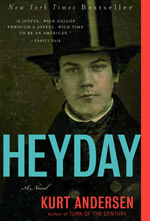 In this engaging novel, Andersen immerses the reader in rich quotidian details of life in New York City and California. The chase across the entire continent allows Andersen to portray the middle of the country, its history and prospects as of 1848, an area often neglected by historical fiction. The Midwestern utopian communities of the mid-nineteenth century are particularly well-described. Meditations on American inventiveness run throughout the book.
In this engaging novel, Andersen immerses the reader in rich quotidian details of life in New York City and California. The chase across the entire continent allows Andersen to portray the middle of the country, its history and prospects as of 1848, an area often neglected by historical fiction. The Midwestern utopian communities of the mid-nineteenth century are particularly well-described. Meditations on American inventiveness run throughout the book.
The reader acquires much social history from this 1848 setting. Where appropriate to the plot, the characters ruminate about political events or are in contact with actual actors on the political, economic, or cultural stage, thereby giving the reader political and economic history, especially relating to technology, in the context of the mid-nineteenth century.
In short, Heyday, a novel is both excellent fiction and lavishly excellent history.
The Langum Foundation Announces Winner of the 2007 David J. Langum, Sr. Prize in American Legal History
The Langum Foundation is pleased to announce that the winner of the 2007 David J. Langum, Sr. Prize in American Legal History is Bruce J. Dierenfield for his book, The Battle over School Prayer: How Engel v. Vitale Changed America, published by the University Press of Kansas. This prize is awarded annually to the best work of American legal history or American legal biography published by a university press, which is accessible to the educated general public, rooted in sound scholarship, and with themes that touch upon matters of general concern to the American public, past or present.
Dierenfield will receive his award, which carries a stipend of $1,000, in a ceremony held in the auditorium of the central branch of the Birmingham Public Library at 4:00PM, March 8, 2008. Professor Dierenfield will make a few remarks concerning his writing of the book and will respond to questions. A reception will follow. The event is free and the public is warmly invited.
A major issue roiling the American public since the 1960s has been the appropriateness and constitutionality of organized prayers in the American public schools. In Engel v. Vitale [1962] the United States Supreme Court struck down a bland prayer without explicit Christian reference that New York State law permitted and a local school district required students recite as a part of the daily opening exercises. In Engel, its first entry into the school prayer issue, the Court held that even with opt-out provisions that permitted individual students to remain silent or leave the room, the prayer violated the interpretation of the First Amendment that had created a “wall of separation” between church and state. The decision caused great consternation. Adherents of public prayers bemoaned their withdrawal in schools as fostering juvenile delinquency, even communism, and destroying the traditional understanding and privileged place of the Christian religion in the nation. Some with such views denounced the ACLU, atheists, Jews, and others they thought were fomenting trouble by bringing lawsuits based on the First Amendment to challenge prayer in schools.
Dierenfield has done a wonderful job of lucidly describing this controversy and the resulting litigation. Although the heart of the book is the Engel case, he also traces the entire history of the American church and state relationship, with particular reference to religious activity in schools, including Bible reading, student-led prayer, moments of silence, student pre and post-school religious activities within the school grounds, as well as organized prayers and Constitutional amendments designed to restore them.
The book is calm in tone and presents all sides to the controversies. Dierenfield conducted numerous interviews with the Engel parties, lawyers, judge, students, teachers, and school officials, as well as the participants of other court battles over school prayer. As a result of these interviews he is able to describe the impact of the litigation on the individuals directly involved. These were generally vicious taunts and reprisals heaped on the plaintiffs and their families by the advocates of public Christian prayer.
As is true with all of the other books in the Kansas series, Landmark Law Cases and American Society, Dierenfield’s Battle over School Prayer, is not footnoted. However, the thorough scholarship is clearly evident, and the book has an excellent bibliographic essay and a good, useable index. – DJL, Sr.
Beginning this year, 2008, the Langum Prize in American Historical Fiction will be awarded separately, during Centrum Foundation’s Port Townsend Writers’ Conference in July.
The Langum Foundation Sponsoring the Gene E. and Adele R. Malott Prize for Recording Community Activism
The Gene E. and Adele R. Malott Prize for Recording Community Activism recognizes biannually the best literary depiction of an individual or small group of individuals whose efforts resulted in a significant improvement of their local community. Although the work of community improvement must be significant, the basis of the prize will be the skill and power of the literary or film depiction. Eligible media include books, magazine articles, series of newspaper articles, or films, published or released within the past two years of a prize cycle, e.g., published or released in 2007 or 2008 for the prize awarded in 2009.
The prize for the writer, or in case of a film divided between the director and screenwriter, is $1,500. If ongoing, the underlying project of community activism will receive $1,000. The winners are asked to attend an award ceremony, ideally held in the community where the activism was accomplished, and a dinner honoring them. The Trust defrays all travel and other expenses.
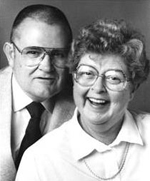
Gene E. and Adele R. Malott
Gene E. Malott (1933-1999) and Adele R. Malott (1935-2005) created careers in print journalism, as reporters, editors, and publishers of newspapers and magazines, winning many awards for their endeavors. Later in their lives, they turned to travel writing, making a niche in writing directed toward senior travelers. Gene Malott received the prestigious La Pluma de Plata award, or silver pen, from the Mexican government for his writing on Mexico, and the members of the Society of American Travel Writers elected Adele Malott as their president. Throughout most of their careers, the Malotts lived in relatively small communities, San Mateo, California;
Little Falls, Minnesota; Reno, Nevada, and were keen enthusiasts of their local issues and politics, as both reporters and participants. Even in their later years when travel writing required frequent international journeys, they remained, as they were throughout their lives, devoted to and enthusiastic about the communities in which they lived. Adele R. Malott established the Malott Prize through a bequest to The Langum Foundation, whose founder and Director, David J. Langum, Sr., was a close friend of the Malotts since the mid-1960s.
Adele Malott was convinced, in her words, that “at democracy’s heart are people who find themselves agitating for change to make things better, repair something that has broken down or create new solutions for old problems. Such changes do not come easily. Nor without pain and leadership.” Some examples include Erin Brockovich, a file clerk in an attorney’s office who shook Pacific Gas & Electric Company by the scruff of its neck and alerted Hinkley, California to the carcinogenic pollutants the company was leaching into the city’s water supply. Her successful efforts inspired the popular 2000 film, Erin Brockovich. In this case, while Erin Brockovich herself would not be eligible for the Malott Prize, the movie would be. Another example would be the work of John Champion, a machinist in Reno, Nevada, who found filth and pollution in the local Truckee River, and trash and transients along its banks. His agitation and personal example of cleanup drew media attention to these conditions and sparked renewal projects significant enough that the city named a park along the river in his honor. While Champion’s efforts themselves would not be eligible for the Malott Prize, a series of articles in the local media about his efforts would be, and ongoing river projects would be eligible for the supplemental award for the underlying project. The object of community activism could range very broadly, from corrupt officials to local crime, anything that is substantial and essentially located within a community.
Adele Malott was most interested in grassroots activists. She was fascinated by the motivation of quite ordinary people who “found themselves in circumstances that pulled them out of the crowd and caused them to speak up,” even as neighbors judged them busybodies and politicians judged them troublemakers. She wrote that she wished the prize-winning accounts to show us what made the activists move, “what pushed him/her to get off the couch and spend hours at countless meetings trying to be heard, trying to persuade people to help pick up the load and move toward a solution. We should be seeing things through this activist’s eyes.”
The deadline for materials published or released in 2007 is January 1, 2008, and materials published or released in 2008 must be submitted by January 1, 2009. This pattern will continue hereafter, with materials published or produced in any given year due for submission at the end of that year. We are asking for these staggered submissions, even though the prize itself is biannual, so that our selection committee can consider submissions on a rolling basis. Please submit three copies of each book, magazine article, or series of newspaper articles. We ask for three DVDs of films, together with three transcripts.
Send all submissions to address indicated on our website, www.langumfoundation.org. As of 2007 that address is: The Langum Foundation, P.O. Box 12643, Birmingham, Alabama 35202-2643. Address questions to David J. Langum, Sr., Director, at the same address, or send by e-mail to langumtrust@gmail.com. We expect to announce the winners on our website.
The Langum Foundation Deeply Laments the Suspension of Publication of American Heritage
The Langum Foundation Deeply Laments the Suspension of Publication of American Heritage, the high quality-journal of American history that successfully brought the richness of their nation’s history to two generations of Americans. The same issue (May 17, 2007) of the New York Times which announced this news also reported the results of a 2006 federal survey of student performance on history exams. The statistics showed that the percentage of students who had a basic understanding of American history, not proficient or advanced, measured by performance on a national history test, was 70% for fourth graders, but declined to 65% for eighth graders and then to 47% for high school seniors. Commented David J. Langum, Sr., Director of the Langum Trust, “There are many theories about the cause for this decline over the course of students’ education, but the ultimate fact is that the majority of American high school graduates lack even a basic knowledge of American history. College will usually not help those who continue their education because American history is no longer generally a required part of universities’ curricula or has been reduced to a single course.”
The demise of the American Heritage and the continued historical illiteracy of American high school seniors, emphasize the important role of historical fiction in bringing history to the educated general public. Santayana’s jeremiad that a people “who cannot remember the past are condemned to repeat it,” is a gross over-simplification, yet, notes Langum, “history does teach valuable cautionary lessons, and the United States now and in the past ignores them to the nation’s and her people’s great peril.”
The Langum Foundation Announces Changes in its David J. Langum, Sr. Prize in American Historical Fiction
Beginning with the 2007 prize, awarded in 2008, commercial trade press publications will be eligible for the Langum Prize in American Historical Fiction, as well as university presses and small presses. Self-published and subsidized books will continue to be ineligible.
“This does not represent a change in substance or standards from our previous practices,” said David J. Langum, Sr, the Director of the Langum Foundation. “We will continue to seek books that are both excellent history and excellent literature and that will allow the educated general reader access to the richness of American history. The addition of trade press publications will simply make the competition more robust.” The Langum Prize in American Historical Fiction is the only annual prize honoring American historical fiction for adult readers and across all geographic regions of America.
The anticipated increase in submissions has necessitated an increase in the size of the selection committee and also a change in venue for the awarding of the prize.
The new selection committee for the American history prize consists of:
Peter Donahue, Associate Professor of English, Birmingham-Southern College, and author of, among other works, Madison House: A Novel and The Cornelius Arms.
David J. Langum, Sr., Research Professor, Samford University, founder of The Langum Foundation, and author of, among other works, Crossing Over the Line: Legislating Morality and the Mann Act and William M. Kunstler: The Most Hated Lawyer in America.
Virginia E. Langum, M.A., Trinity College, Dublin, M.S. Columbia School of Journalism, M.Phil candidate, Cambridge University.
Katherine Vaz, Briggs-Copeland Lecturer in Fiction, Harvard University, 2006-7 Fellow of the Radcliffe Institute, and author of, among other works, Mariana and Saudade.
Of the new selection committee, David J. Langum, Sr. noted that “Katherine Vaz and Peter Donahue have academic interests in historical fiction and at the same time are published writers in that genre. They are talented writers with a great deal of respect for historical verisimilitude. We are fortunate to have their assistance.”
Beginning in 2008, in respect to the 2007 winner, the Langum Prize in American Historical Fiction will be awarded every July in Port Townsend, Washington, in a ceremony held in cooperation with the Centrum Foundation’s annual Port Townsend Writers’ Conference. The Langum Foundation and Centrum are completely different foundations, and The Langum Foundation will be solely responsible for the selection of its winners and the financing of its award and ceremony. “Nevertheless,” noted Langum, “there will advantages to each organization to awarding this prize in conjunction with the Port Townsend Writers’ Conference, a major conference enjoying the idyllic summers of Washington’s Olympic Peninsula.” The Langum Foundation will continue to award the Langum Prize in Legal History and Legal Biography in March of each year at the Birmingham Public Library in Birmingham, Alabama.
Books from Small Presses Now Eligible for Historical Fiction Prize
Books published by small presses as well as university presses are now eligible for the historical fiction prize. A small press is defined as one that in the preceding year has published no fewer than five and no more than 50 books by itself or through affiliates, and has accepted no subsidy or payment from the author of the book submitted. Because of the difficulty of contacting small presses, we will rely primarily upon author submissions.
Travel to Collections Grants Now Available
Grants are now available for the Travel to Collections initiative. See the Travel to Collections page for details.



